
- Registration
- Roll No Slips
- Duplicate Bill
- Tips & Guide

Essay on Allama Muhammad Iqbal in English
The architect of the ideology of Pakistan Doctor Allama Iqbal is, undoubtedly, the great Islamic thinker of the modern times and one of the greatest of all time. He is a great poet, philosopher, educationist, and reformer. He had made a lasting contribution to Human thought. His poetic works made him immortal. Essay on Allama Muhammad Iqbal in English with Quotations. Allama Iqbal was the great poet-philosopher and active political leader born at Sialkot, Punjab, in 1877. He descended from a family of Kashmiri Brahmans, who had embraced Islam about 300 years earlier.
Allama Iqbal received his early education in the traditional Madrassa. Later he joined the Sialkot Mission School, from where he passed his matriculate examination. In 1897, he obtained his Bachelor of Arts Degree from Government College, Lahore. After Two years , he secured his Masters Degree and was appointed in the Oriental College, Lahore, as a lecturer of history, philosophy and English. He later proceeded to Europe for higher studies. Having obtained a degree from Cambridge, he secured his doctorate at Munich and finally qualified as a lawyer.
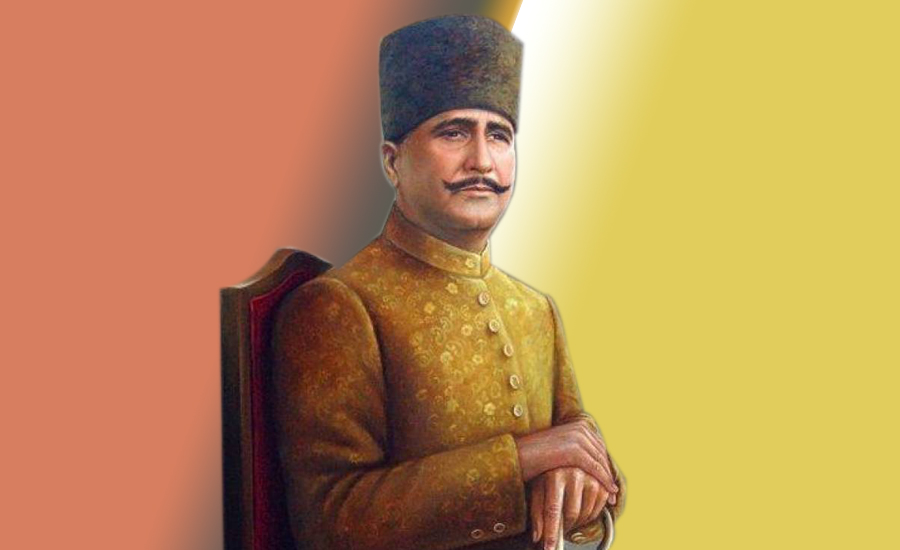
He returned to India in 1908. Besides teaching and practicing law, Iqbal continued to write poetry. He resigned from government service in 1911 and took up the task of propagating individual thinking among the Muslims through poetry. When the Hindu philosophers presented this philosophy that a nation is born throughout the country and when Maulana Hussam Ahmed Madni seconded it then Iqbal reacted strongly towards it.
Allama Iqbal his debut in politics then he was elected as the member of Punjab’s legislative assembly in 1926, during the elections of 1937 when Quaid-e-Azam started re contructioning of the Muslim League Allama Iqbal was along with him.
Allama Iqbal believe that the Muslims of India have a separate identity and to protect his identity the establishment of a separate homeland for the Muslims of india was necessary. On 28 March 1909 he excusing the invitation from the secular party “Minsva Lodge” said I have been a keen supporter of this theory that religious differences in the country should end and even now I practice the principle. During 1930-32 three sessions of Round Table Conference were held. Iqbal attended second and third round table conference. Having attended the second round table conference in September 1931 in London, he was keenly aware of the deep seated Hindu and Sikh prejudice and unaccommodating attitude.
Iqbal also acted as the Right hand of Muhammad Ali Jinnah. Iqbal also worked for the prosperity of Muslims. But He could not see his dream becoming a reality and died on 21st April 1938. His Tomb is near the main gate of Badshahi Mosque.He gave the message of Love, brotherhood, hope, and self-awareness. His message will remain forever. May his soul rest in peace.
Related Study Posts:
- Allama Iqbal Medical College AIMC Merit List 2024…
- My Best Friend Essay in English
- Essay on Bright Future of Pakistan in English
- Essay Quaid-e-Azam Mohammad Ali Jinnah in English
- Essay on Corruption in Pakistan Its Causes
- Essay on Pollution in Pakistan and Its Causes
- Essay Why I Love Pakistan With Outline
- Essay on Terrorism in Pakistan Causes Effects and Solution
- Education Should Be Free Essay Long and Short
- FEBF Essay Writing Competition in Pakistan 2024…
You May Also Like
Asf interview schedule 2024 announced asi and corporal, how to join pakistan air force after matric fa/fsc, cover letter for jobs application, how to write resignation letter for jobs format sample, national jobs portal 2024 create account @ www.njp.gov.pk, scope salary of environmental sciences in pakistan jobs.
About the Author: Mustansar Khan
Leave a reply cancel reply.
Your email address will not be published. Required fields are marked *

30,000+ students realised their study abroad dream with us. Take the first step today
Meet top uk universities from the comfort of your home, here’s your new year gift, one app for all your, study abroad needs, start your journey, track your progress, grow with the community and so much more.

Verification Code
An OTP has been sent to your registered mobile no. Please verify

Thanks for your comment !
Our team will review it before it's shown to our readers.

- School Education /
Essay on Allama Iqbal in 450 Words

- Updated on
- Sep 16, 2023

The real name of Allama Iqbal was Mohammad Iqbal. He was born on November 9, in the year 1877, in Sialkot, Punjab. Iqbal belonged to a Kashmiri Brahmin family that embraced Islam in the seventeenth century. After receiving his traditional education in Arabic, Persian, and Urdu, he turned to liberal education which helped in encouraging his interest in poetry in his life. He started his educational career at the Scottish Mission School and he went on to acquire his degree in M.A. Philosophy. After that, he joined the Trinity College. Further, he got his degree of doctorate from the University of Munich, Germany by working on his thesis ‘The Development of Metaphysics’ in Persia. Continue reading the essay on Allama Iqbal to know more about his life.
Table of Contents
- 1 Essay on Allama Iqbal in 450 Words
- 2 Philosophical Position and Influence of Muhammad Iqbal
- 3 Popular Works of Allama Iqbal
Also Read: Allama Iqbal Shayari on Life, love, and Inspiration
Allama Iqbal is known for his influential efforts in directing his fellow Muslims in British-administered India toward the idea of establishment of a separate Muslim State. This aspiration was eventually realized during The Partition of 1947.
After completing his education and returning from Europe, he gained his bread and butter via practicing Law, but the fame he acquired was from his Persian and Urdu-language poetry, which he wrote in a classical style to make it easy for the public to recite. His poetry became widely known through poetic synopsis and in a milieu in which memorizing verse was customary.
Also Read: Essay on Mahatma Gandhi
Philosophical Position and Influence of Muhammad Iqbal
In The Reconstruction of Religious Thought in Islam (1934) his philosophical position was articulated. This was a volume based on six lectures delivered at Madras and Aligarh in 1928-29. He argued that a man who is rightly focused should generate vitality unceasingly through his interaction with the purposes of the living god.
Allama Iqbal had returned from his unitary experience of god to let loose on Earth a new type of Cultural World and manhood through the abolition of priesthood and hereditary kingship and by emphasis on the study of Nature and History. Iqbal also promoted and advocated the theory of ijma i.e. consensus.
During the time he was delivering lectures, he began working with the Muslim League. In the year 1930, at the annual session of the league at Allahabad, Iqbal gave the presidential address and made a statement that the Muslims of North-Western India should demand status as a separate state.
Popular Works of Allama Iqbal
There were 3 significant poems written by him namely, Shikwah (The Compliant), Jawab-e Shikwah (The Answer to the Compliant), and Khizr-e rah (Khizr, The Guide) which were published later in the year 1924 in the Urdu collection Bang-e rah (The Call of the Bell). In these poems, via his words, Iqbal gave an intense expression to the anguish of the Muslim powerlessness.
Although Iqbal was in favor of the creation of Pakistan and is known as the Nation’s National poet, he wrote a famous patriotic song in the year 1905 that celebrates the Greatness of India. A song that is recited by every Indian and proudly puts forth feelings of love and loyalty towards India, the song is ‘Saare Jahaan Se Achha‘ which is also known as ‘Tarana-e Hind’.
The year 1923 saw King George V bestow a knighthood upon Allama Iqbal, who went on to be known as “Sir Mohammad Iqbal” from that point forward.
Allama Iqbal is regarded as a poet-philosopher of the East who addressed the Muslim ummah and believed in the Wahdatul wujood. He wrote in both, Persian as well as Urdu.
His poetry emerged as an amazing site where art and message converged to deliver his individual vision. He used to include a lot of poetic devices such as myth, metaphors, symbols, etc. Some of his works that are widely recognized include a collection of poems namely, Rumooz-e Bekhudi, Baal-e Jibreel, Zaboor-e ‘Ajm, Javed Naama, Payaam-e Mashriq, etc.
Allama Iqbal died on April 21, 1938, in Lahore, Punjab. He has been acclaimed as the father of Pakistan and hence, Iqbal Day is celebrated in Pakistan on November 9. Sir Muhammad Iqbal was a Pakistani Poet-Philosopher and is known as the National Poet of Pakistan. He has been acclaimed as the father of Pakistan and hence, Iqbal Day is celebrated in Pakistan on November 9.
Also Read:- The Evergreen Shayari of Gulzar
Ans: Sir Muhammad Iqbal wrote a famous patriotic song in the year 1905 that celebrates the Greatness of India. A song that is recited by every Indian and proudly puts forth feelings of love and loyalty towards India, that song is ‘Saare Jahaan Se Achha‘ which is also known as ‘Tarana-e Hind’
Ans: Allama Iqbal is known for his influential efforts in directing his fellow Muslims in British-administered India toward the idea of establishment of a separate Muslim State. This aspiration was eventually realized during The Partition of 1947.
Ans: Muhammad Iqbal is frequently referred to as Allama Iqbal, where Allama is an Urdu word for ‘Scholar’. He was a renowned scholar and was famous for his Urdu poetry
We hope this blog on Allama Iqbal helped you gain knowledge about him. Follow Leverage Edu for more interesting articles and topics on essay writing .
Deepansh Gautam
Leave a Reply Cancel reply
Save my name, email, and website in this browser for the next time I comment.
Contact no. *

Connect With Us

30,000+ students realised their study abroad dream with us. Take the first step today.

Resend OTP in

Need help with?
Study abroad.
UK, Canada, US & More
IELTS, GRE, GMAT & More
Scholarship, Loans & Forex
Country Preference
New Zealand
Which English test are you planning to take?
Which academic test are you planning to take.
Not Sure yet
When are you planning to take the exam?
Already booked my exam slot
Within 2 Months
Want to learn about the test
Which Degree do you wish to pursue?
When do you want to start studying abroad.
January 2024
September 2024
What is your budget to study abroad?

How would you describe this article ?
Please rate this article
We would like to hear more.
Have something on your mind?

Make your study abroad dream a reality in January 2022 with
India's Biggest Virtual University Fair

Essex Direct Admission Day
Why attend .

Don't Miss Out
- Skip to primary navigation
- Skip to main content
- Skip to primary sidebar
500 Words Essay on Allama Iqbal in English

by Cherie McCord
Allama Iqbal was undoubtedly a prestigious National hero born in Sialkot. He was an outstanding poet-philosopher and political leader. However, writing an essay on such great personalities requires enormous time and research to do complete justice. Hence, availing help from expert essay writers can make your life easier. They perform detailed research and write an essay that surely entices the readers.
500 words Complete essay on Allama Iqbal in English. You can use the Allama Iqbal essay as my favourite poet, hero, and personality as well. Allama Iqbal is the national poet of Pakistan. He was born in Sialkot in 1877. After completing his primary education in Sialkot, he moved to Lahore for further studies.
He did his MA in philosophy there and taught for some time in the GC Lahore. After that, he went to Germany for his PhD in philosophy.
At that time, English were the ruler of India. They were trying their utmost to confine Muslims to the cages of slavery and ignorance. Therefore, the situation of Muslims was pathetic during that time. They were not offered high-rank jobs in Government.
Iqbal, being a well-wisher of Muslims, tried to awaken them from the deep sleep of negligence. He used the power of poems and verses to give Muslims of the subcontinent a light of hope. He reminded them of the achievements and standards of their forefathers.
Visit essayservice.com for best eassy writing services.
Table of Contents
Essay on Allama Iqbal Quotes
I lead no party; I follow no leader. I have given the best part of my life to careful study of Islam, its law and polity, its culture, its history, and its literature Allama Iqbal
Nations are born in the hearts of poets, they prosper and die in the hands of politicians. Allama Iqbal
Two Nation Theory by Allama Iqbal
He also wrote letters to Quaid-e-Azam to work for his depressed nation. In his Allahabad session, he gave the solution to the problems of Muslims in the form of Two Nation Theory. He believed that Muslims are different in every aspect of life from Hindus. He suggested that Muslims should work for getting their own homeland.
Iqbal as a Poet
Iqbal was a great poet. The goal of his poetry was to remind the Muslims of their glorious history. His poetry highlighted golden Muslim traditions and achievements. Every verse by Iqbal gave Muslims a wake-up call to regain their respect. It is full of permanent national feelings.
Teachings by Allama Iqbal
He wrote poetry both in Urdu and Persian. His verses give reference to the Holy Quran. It gives a sense of spirituality and morality. In this age, Muslims need to get guidance from his poetry. He is our hero and one of the people who laid the foundation of Pakistan.
Allama Iqbal died on 21st April 1938 due to severe throat infection. May his would rest in heaven. May his words continue to inspire young generations to follow the path of self-esteem.
We hope that this essay on Allama Iqbal has provided you enough information to use it in 9th, 10th, first year and second year classes and you won’t need to ask expert essay help from someone from Write My Paper Hub for writing your own paper on similar topics.

Essay On Allama Iqbal
This essay delves into the life, contributions, and legacy of Allama Iqbal , a renowned poet, philosopher, and political leader pivotal in the establishment of Pakistan. It encompasses an exploration of his life events, literary works, visionary perspectives, and lasting impact. The essay sheds light on his crucial role in fostering Muslim unity and advocating for a distinct homeland for the Muslims of the Indian subcontinent. Additionally, it delves into the profound philosophical and spiritual themes embedded in Allama Iqbal’s poetry . Notably, Allama Iqbal was born on November 9, 1877, and he departed from this world on April 21, 1938.
Essay On Allama Iqbal 100 Words
Allama Iqbal, born on November 9, 1877, in Sialkot, Punjab, British India, earned renown as a poet, philosopher, and political thinker, playing a pivotal role in the independence movement of Pakistan.
A strong proponent of Muslim unity, Iqbal underscored the necessity for a distinct homeland for the Muslims of the subcontinent. His extensive writings delved into Islamic philosophy, spirituality, and nationalism.
His poetry stands out for its profound philosophical insights and spiritual depth, with notable works including “Asrar-e-Khudi,” “Zarb-i-Kalim,” and “Bang-i-Dra.” The widely recited poem “Lab Pe Aati Hai Dua Ban Ke Tamanna Meri” is particularly famous in schools and gatherings across Pakistan.
Allama Iqbal’s visionary outlook anticipated the challenges confronting the Muslim world, and he advocated for their elevation through education and intellectual empowerment. His passing on April 21, 1938, in Lahore marked the end of a life dedicated to leaving behind a lasting legacy of poetry, philosophy, and political thought.
Allama Iqbal essay in English for class 1
Allama Iqbal, a distinguished poet and intellectual figure in Pakistan, came into the world on 9th November 1877 in Sialkot, a city situated in Punjab. Proficient in both Urdu and Persian languages, he earned the title of the “Poet of the East.”
Deeply devoted to his country and religion, Allama Iqbal ardently desired a separate homeland for the Muslims of India. This vision took shape during his renowned speech in Allahabad in 1930, where he proposed the idea of Pakistan. His vision emphasized the creation of a distinct state for Muslims to uphold their unique culture and values.
In addition to his poetic pursuits, Allama Iqbal was a learned scholar and philosopher. Having pursued education in various countries, including England and Germany, he authored numerous books on Islamic philosophy and history. His lectures on the reconstruction of religious thought in Islam aimed at fortifying Muslims and fostering self-reliance.
Allama Iqbal breathed his last on 21st April 1938 in Lahore, where he found his final resting place near the Badshahi Mosque. His tomb draws many admirers who pay homage to his legacy. Recognized as the national poet of Pakistan, Iqbal’s birthday is commemorated annually as Iqbal Day, serving as a perennial source of inspiration for all Pakistanis.
Essay on Allama Iqbal in Urdu for class 2
علامہ اقبال پاکستان کے عظیم شاعر اور رہنما تھے۔ وہ 9 نومبر 1877 کو سیالکوٹ میں پیدا ہوئے، ان کے والد کا نام شیخ نور محمد اور والدہ کا نام امام بی بی تھا۔ اس کے دو بھائی اور ایک بہن تھی۔
علامہ اقبال کو بچپن ہی سے لکھنے پڑھنے کا شوق تھا۔ انہوں نے اردو، فارسی، عربی اور انگریزی زبانیں سیکھیں۔ انہوں نے اردو اور فارسی میں خوبصورت نظمیں لکھیں۔ انہیں شاعر مشرق بھی کہا جاتا ہے۔
علامہ اقبال چاہتے تھے کہ ہندوستان کے مسلمان انگریزوں کے تسلط سے آزاد ہوں۔ انہوں نے 1930 میں الہ آباد میں اپنی مشہور تقریر میں پاکستان کا نظریہ دیا، انہوں نے کہا کہ مسلمانوں کا ایک الگ ملک ہونا چاہیے جہاں وہ اسلام کے مطابق زندگی گزار سکیں۔
علامہ اقبال بھی ایک عقلمند اور بہادر رہنما تھے۔ انہوں نے مسلم لیگ میں شمولیت اختیار کی اور قیام پاکستان کے لیے قائد اعظم محمد علی جناح کے ساتھ کام کیا۔ انہوں نے قائداعظم کو خطوط بھی لکھے اور مشورہ بھی دیا۔
علامہ اقبال کا انتقال 21 اپریل 1938 کو لاہور میں ہوا۔ وہ بادشاہی مسجد کے قریب دفن ہیں۔ ان کا مقبرہ ایک خوبصورت جگہ ہے جہاں بہت سے لوگ آتے ہیں اور احترام کرتے ہیں۔ وہ پاکستان کے قومی شاعر ہیں اور ان کا یوم پیدائش ہر سال یوم اقبال کے طور پر منایا جاتا ہے۔ ہمیں علامہ اقبال اور پاکستان کے لیے ان کی خدمات پر فخر ہے۔
Allama Iqbal Essay in Urdu for class 3
علامہ اقبال پاکستان کے مشہور شاعر، فلسفی اور رہنما تھے۔ وہ 9 نومبر 1877 کو سیالکوٹ میں پیدا ہوئے۔ ان کے والد شیخ نور محمد اور والدہ کا نام امام بی بی تھا۔ اس کا ایک بھائی اور ایک بہن تھی۔
علامہ اقبال بہت ذہین اور محنتی تھے۔ انہوں نے اردو، فارسی، عربی اور انگریزی زبانوں کا مطالعہ کیا۔ انہوں نے اردو اور فارسی میں نظمیں لکھیں جو بہت خوبصورت اور معنی خیز ہیں۔ انہیں مشرق کا شاعر بھی کہا جاتا ہے۔
علامہ اقبال چاہتے تھے کہ ہندوستان کے مسلمان انگریزوں کے تسلط سے آزاد ہوں۔ انہوں نے 1930 میں الہ آباد میں اپنی تقریر میں پاکستان کا نظریہ دیا، انہوں نے کہا کہ مسلمانوں کا ایک الگ ملک ہونا چاہیے جہاں وہ اسلام کے مطابق زندگی گزار سکیں۔
علامہ اقبال بھی ایک بہادر اور دیانتدار رہنما تھے۔ انہوں نے مسلم لیگ میں شمولیت اختیار کی اور قیام پاکستان کے لیے قائد اعظم محمد علی جناح کے ساتھ کام کیا۔ انہوں نے قائداعظم کو خطوط بھی لکھے اور مشورہ بھی دیا۔
علامہ اقبال کا انتقال 21 اپریل 1938 کو لاہور میں ہوا۔ وہ بادشاہی مسجد کے قریب دفن ہیں۔ ان کا مقبرہ ایک خوبصورت جگہ ہے جہاں بہت سے لوگ آتے ہیں اور احترام کرتے ہیں۔ وہ پاکستان کے قومی شاعر ہیں اور ان کا یوم پیدائش ہر سال یوم اقبال کے طور پر منایا جاتا ہے۔ ہمیں علامہ اقبال اور ان کی شاعری سے پیار ہے۔
Allama Iqbal essay class 4
Allama Iqbal, a distinguished poet, philosopher, and statesman of Pakistan, entered the world in Sialkot on 9th November 1877. Born to Sheikh Noor Muhammad and Imam Bibi, he had a brother named Sheikh Ata Muhammad and a sister named Fatima Jinnah.
Demonstrating remarkable talent and diligence, Allama Iqbal immersed himself in the study of Urdu, Persian, Arabic, and English languages. His poetic prowess extended to both Urdu and Persian, earning him the title of the “Poet of the East.”
Driven by a desire for the freedom of Muslims in India from British rule, Allama Iqbal proposed the concept of Pakistan during his 1930 speech in Allahabad. He envisioned a separate nation where Muslims could live in accordance with the principles of Islam.
In addition to his role as a visionary poet, Allama Iqbal displayed courage and integrity as a leader. Aligning with the Muslim League, he collaborated with Quaid-e-Azam Muhammad Ali Jinnah in the endeavor to establish Pakistan. His letters to Quaid-e-Azam served as insightful advice during this crucial period.
Allama Iqbal departed from this world on 21st April 1938 in Lahore, finding his final resting place near the Badshahi Mosque. His tomb, a serene and revered site, attracts numerous visitors paying homage. Recognized as the national poet of Pakistan, his birthday is commemorated annually as Iqbal Day, a testament to the enduring love and admiration for Allama Iqbal and his timeless poetry.
Essay on Allama Iqbal in English for class 5
Allama Iqbal, a renowned poet, philosopher, and statesman of Pakistan, was born in Sialkot on 9th November 1877. His parents were Sheikh Noor Muhammad and Imam Bibi, and he had a brother named Sheikh Ata Muhammad and a sister named Fatima Jinnah.
Allama Iqbal’s exceptional talent and diligence were evident in his mastery of Urdu, Persian, Arabic, and English languages. His poems in both Urdu and Persian gained widespread acclaim, earning him the epithet “Poet of the East.”
Driven by a fervent desire for the freedom of Muslims in India from British rule, Allama Iqbal presented the concept of Pakistan during his 1930 speech in Allahabad. He envisioned a separate nation where Muslims could live in accordance with Islamic principles.
In addition to his role as a visionary poet, Allama Iqbal displayed courage and integrity as a leader. Aligning with the Muslim League, he collaborated with Quaid-e-Azam Muhammad Ali Jinnah in the efforts toward the creation of Pakistan. His letters to Quaid-e-Azam offered valuable advice during this critical period.
Allama Iqbal passed away on 21st April 1938 in Lahore and found his final resting place near the Badshahi Mosque. His tomb, a serene and revered location, attracts numerous visitors who come to pay their respects. Recognized as the national poet of Pakistan, his birthday is celebrated annually as Iqbal Day, a testament to the enduring love and admiration for Allama Iqbal and his timeless poetry.
Allama Iqbal essay in English for class 6
Allama Iqbal, a renowned poet, philosopher, and statesman of Pakistan, entered the world in Sialkot on 9th November 1877. His parents were Sheikh Noor Muhammad and Imam Bibi, and he had a brother named Sheikh Ata Muhammad and a sister named Fatima Jinnah.
Demonstrating exceptional talent and diligence, Allama Iqbal immersed himself in the study of Urdu, Persian, Arabic, and English languages. His poems in both Urdu and Persian, including notable works like Shikwa, Jawab-e-Shikwa, Asrar-e-Khudi, and Bang-e-Dara, are celebrated for their fame and inspiration. He is also recognized as the “Poet of the East.”
Fueled by a fervent desire for the freedom of Muslims in India from British rule, Allama Iqbal presented the concept of Pakistan in his 1930 speech at Allahabad. He envisioned a separate nation where Muslims could live in accordance with Islamic principles. His famous song, “Saare Jahan Se Achha,” expresses his love for India.
In addition to his role as a visionary poet, Allama Iqbal displayed courage and integrity as a leader. He joined the Muslim League, collaborating with Quaid-e-Azam Muhammad Ali Jinnah in the efforts towards the creation of Pakistan. Allama Iqbal’s correspondence with Quaid-e-Azam showcased his insightful advice. He also engaged with other leaders such as Gandhi, Nehru, and Jinnah.
Allama Iqbal departed from this world on 21st April 1938 in Lahore, finding his final resting place near the Badshahi Mosque. His tomb, a serene and revered location, attracts numerous visitors who come to pay their respects. Recognized as the national poet of Pakistan, his birthday is celebrated annually as Iqbal Day, a testament to the enduring love and admiration for Allama Iqbal and his timeless poetry.
Allama iqbal essay in urdu class 6
علامہ اقبال ایک مشہور شاعر، فلسفی اور سیاسی مفکر تھے جنہوں نے پاکستان کی تحریک آزادی میں نمایاں کردار ادا کیا۔ وہ 9 نومبر 1877 کو سیالکوٹ، پنجاب، برطانوی ہندوستان میں پیدا ہوئے۔
اقبال مسلم اتحاد کے داعی تھے اور انہوں نے برصغیر کے مسلمانوں کے لیے علیحدہ وطن کی ضرورت پر زور دیا۔ انہوں نے اسلامی فلسفہ، روحانیت اور قوم پرستی کے موضوعات پر وسیع پیمانے پر لکھا۔
ان کی شاعری اپنی گہری فلسفیانہ بصیرت اور گہری روحانیت کے لیے مشہور ہے۔ ان کی مشہور تصانیف میں “اسرارِ خودی،” “ضربِ کلیم،” اور “بنگ درا” شامل ہیں۔ وہ اپنی مشہور نظم “لیب پہ آتی ہے دعا بن کے تمنا میری” کے لیے بھی جانا جاتا ہے، جسے پاکستان کے اسکولوں اور اجتماعات میں بڑے پیمانے پر پڑھا جاتا ہے۔
علامہ اقبال ایک وژنری تھے جنہوں نے مسلم دنیا کو درپیش چیلنجز کا پیش خیمہ کیا اور تعلیم اور فکری بااختیار بنانے کے ذریعے ان کی بہتری کی وکالت کی۔ وہ 21 اپریل 1938 کو لاہور میں وفات پاگئے، شاعری، فلسفے اور سیاسی فکر کی ایک بھرپور میراث چھوڑ گئے۔
Allama iqbal essay in English for class 8
Allama Iqbal, a renowned poet, philosopher, and leader of Pakistan, was born in Sialkot on 9th November 1877 to Sheikh Noor Muhammad and Imam Bibi. His familial ties included a brother named Sheikh Ata Muhammad and a sister named Fatima Jinnah.
Known for his exceptional talent and unwavering diligence, Allama Iqbal delved into the study of Urdu, Persian, Arabic, and English languages. His poetry, resonating in both Urdu and Persian, has gained widespread acclaim, earning him the title “Poet of the East.” Some of his notable works include Shikwa, Jawab-e-Shikwa, Asrar-e-Khudi, Bang-e-Dara, Zarb-e-Kaleem, and Bal-e-Jibril.
Driven by a fervent desire for the freedom of Muslims in India from British rule, Allama Iqbal proposed the idea of Pakistan during his 1930 speech in Allahabad. He envisioned a separate nation where Muslims could live in accordance with the principles of Islam. His famous song, “Saare Jahan Se Achha,” expresses his love for India.
In addition to his role as a courageous and honest leader, Allama Iqbal was a scholar and thinker. His educational journey took him to various countries, including England, Germany, and Spain. He authored numerous books on Islamic philosophy and history, delivering lectures on the reconstruction of religious thought in Islam. His vision was rooted in the aspiration for a strong and self-reliant Muslim community.
Allama Iqbal departed from this world on 21st April 1938 in Lahore and found his final resting place near the Badshahi Mosque. His tomb, a serene and revered location, attracts numerous visitors who come to pay their respects. Recognized as the national poet of Pakistan, his birthday is celebrated annually as Iqbal Day, a testament to the enduring love and admiration for Allama Iqbal and his timeless poetry.
Allama Iqbal essay in English for class 12
Allama Iqbal, a distinguished poet, philosopher, and intellectual luminary, served as a profound inspiration for the Pakistan movement. Widely acknowledged as the national poet of Pakistan, he stands as one of the most influential figures in Urdu literature, celebrated for the depth, beauty, and originality of his poetry in both Urdu and Persian. Beyond his poetic accomplishments, Iqbal authored numerous works on Islamic philosophy, politics, and history.
Born on 9 November 1877 in Sialkot, Punjab, a part of British India at that time, Iqbal hailed from a family where his father, Sheikh Noor Muhammad, was a devout Muslim and a skilled tailor. His mother, Imam Bibi, played a pivotal role in nurturing his education and encouraging his pursuits. Iqbal’s early education was acquired from a local madrassa and a Scottish Mission School, where he mastered Arabic, Persian, and Urdu languages, fostering a profound interest in poetry and religion.
Continuing his educational journey, Iqbal earned his B.A. and M.A. degrees in philosophy from Government College Lahore. Subsequently, he taught Arabic at the Oriental College Lahore before embarking on further studies in England. There, he acquired another B.A. degree from Trinity College Cambridge and a law degree from Lincoln’s Inn. During his time in England, Iqbal had the opportunity to engage with prominent British poets and writers such as Thomas Hardy and William Butler Yeats, whose influence left an indelible mark on his literary style.
Iqbal then moved to Germany to pursue his Ph.D. in philosophy from the University of Munich. His doctoral thesis was titled The Development of Metaphysics in Persia and was later published as a book. He also wrote some of his famous poems in German language, such as Das Geheimnis des Selbst (The Secret of the Self) and Die Lieder des Orients (The Songs of the Orient).
Iqbal returned to Lahore in 1908 and started his law practice. However, he soon devoted himself to writing and teaching. He became a professor of philosophy at the Government College Lahore and later at the Punjab University. He also joined various political and social organizations, such as the Muslim League, the Anjuman-i-Himayat-i-Islam, and the All India Muslim Educational Conference. He participated in the Khilafat Movement, the Aligarh Movement, and the Pakistan Movement.
Iqbal’s poetry reflects his vision of a cultural and political ideal for the Muslims of India. He advocated the revival of Islamic values, the unity of Muslim ummah, and the creation of a separate homeland for Muslims. He also expressed his love for his country, his faith in God, and his quest for self-realization. Some of his famous poetic works are Bang-e-Dara (The Call of the Caravan), Bal-e-Jibril (The Wings of Gabriel), Zarb-e-Kalim (The Blow of Moses), Javed Nama (The Book of Javed), and Armaghan-e-Hijaz (The Gift of Hijaz).
Iqbal died on 21 April 1938 in Lahore after a long illness. He was buried near the Badshahi Mosque in a tomb that is visited by millions of people every year. His legacy lives on in his poetry, his philosophy, and his role in the Pakistan movement. He is widely honored as the Shair-e-Mashriq (The Poet of the East), the Mufakkir-e-Pakistan (The Thinker of Pakistan), and the Hakeem-ul-Ummat (The Sage of the Ummah). He is also considered as one of the greatest poets of all time.
Essay On Allama Iqbal 200 Words
Allama Iqbal, also recognized as Muhammad Iqbal, emerged as a distinguished poet, philosopher, and statesman in the Indian subcontinent. His birth took place on November 9, 1877, in Sialkot, Punjab, during the British India era.
Iqbal fervently advocated for Muslim unity and championed the idea of establishing a separate homeland for Muslims in the Indian subcontinent. His extensive writings delved into Islamic philosophy, spirituality, and nationalism, continuing to serve as a source of inspiration for millions worldwide.
Renowned for his poetry’s profound philosophical insights and spiritual depth, Iqbal composed verses in both Urdu and Persian. Notable among his works are “Asrar-e-Khudi,” “Zarb-i-Kalim,” and “Bang-i-Dra.” His poem “Lab Pe Aati Hai Dua Ban Ke Tamanna Meri” holds a special place, resonating widely in schools and gatherings across Pakistan.
Beyond his poetic endeavors, Allama Iqbal engaged in political activism, affiliating with the All India Muslim League. His pivotal role in the creation of Pakistan materialized his vision for a nation where Muslims could live freely and independently, culminating in the establishment of Pakistan in 1947.
Allama Iqbal’s demise occurred on April 21, 1938, in Lahore, leaving behind a profound legacy encompassing poetry, philosophy, and political thought. His enduring influence extends to individuals globally who cherish values of freedom, independence, and spiritual enlightenment.
Essay On Allama Iqbal 250 Words
Allama Iqbal, also recognized as Muhammad Iqbal, stood as a distinguished poet, philosopher, and political visionary, leaving an enduring impact on the intellectual and political landscape of the Indian subcontinent. His birth occurred on November 9, 1877, in Sialkot, Punjab, within British India.
Iqbal ardently championed the cause of Muslim unity and championed the notion of establishing a distinct homeland for Muslims in the Indian subcontinent. His prolific writings spanned Islamic philosophy, spirituality, and nationalism, sustaining a pervasive influence on countless individuals globally.
Renowned for his poetry’s profound philosophical insights and spiritual profundity, Iqbal crafted verses in both Urdu and Persian. Prominent among his creations are “Asrar-e-Khudi,” “Zarb-i-Kalim,” and “Bang-i-Dra.” His renowned poem, “Lab Pe Aati Hai Dua Ban Ke Tamanna Meri,” enjoys widespread recitation in schools and gatherings throughout Pakistan.
Beyond his poetic pursuits, Allama Iqbal engaged actively in political activism, aligning himself with the All India Muslim League. His pivotal role in the establishment of Pakistan realized his vision for a nation where Muslims could live autonomously and unrestricted, culminating in the country’s formation in 1947.
Iqbal’s philosophy underscored the imperative for Muslims to rediscover their spiritual and intellectual heritage, which he believed had eroded due to colonialism and westernization. He advocated for an embrace of modern education and science while remaining anchored in Islamic principles.
Allama Iqbal passed away on April 21, 1938, in Lahore, leaving behind a substantial legacy of poetry, philosophy, and political thought. His enduring influence continues to resonate globally among those who esteem values of freedom, independence, and spiritual enlightenment. His ideas and works have indelibly shaped the intellectual and cultural narrative of the Indian subcontinent.
Essay On Allama Iqbal 300 Words
Allama Iqbal, revered as a distinguished poet, philosopher, and political thinker in the Indian subcontinent, entered the world on November 9, 1877, in Sialkot, Punjab, British India. Widely acknowledged as one of the greatest Urdu poets in history, Iqbal’s literary contributions remain a source of inspiration for millions worldwide.
A fervent advocate of Muslim unity, Iqbal strongly supported the idea of establishing a separate homeland for Muslims in the Indian subcontinent. His extensive writings on Islamic philosophy, spirituality, and nationalism continue to be subjects of study and analysis for scholars and students globally.
Iqbal’s poetry stands out for its profound philosophical insights and spiritual depth, conveyed in both Urdu and Persian. Notable among his renowned works are “Asrar-e-Khudi,” “Zarb-i-Kalim,” and “Bang-i-Dra.” His widely recited poem, “Lab Pe Aati Hai Dua Ban Ke Tamanna Meri,” resonates in schools and gatherings across Pakistan.
Beyond his poetic pursuits, Allama Iqbal actively engaged in political activism as a member of the All India Muslim League. His instrumental role in the creation of Pakistan realized his vision for a nation where Muslims could live freely and independently, culminating in the country’s establishment in 1947.
Iqbal’s philosophical stance underscored the imperative for Muslims to rediscover their spiritual and intellectual heritage, which he believed had suffered due to colonialism and westernization. He advocated for an embrace of modern education and science while staying true to Islamic roots.
Allama Iqbal’s ideas and works have left an enduring impact on the intellectual and cultural history of the Indian subcontinent. Recognized as a national poet in Pakistan, his birthday is celebrated as a national holiday. Translated into numerous languages, his works continue to inspire people globally.
Allama Iqbal’s passing on April 21, 1938, in Lahore, marked the conclusion of a life that bequeathed a rich legacy of poetry, philosophy, and political thought. His enduring inspiration resonates with those worldwide who value freedom, independence, and spiritual enlightenment, serving as a testament to the potency of human imagination, creativity, and perseverance.
You Might Also Like
Essay On Importance of Dictionary For Class 10
Essay On Prayer and its Meaning For Class 10
Essay On Understanding The Quran With Translation For Class 10
Leave a Comment Cancel reply
Save my name, email, and website in this browser for the next time I comment.
Table of Contents

Short Essay: Allama Iqbal
A couple of short essay examples on Allama Iqbal.
Table of Contents
Allama Iqbal Essay Example 1
Allama Iqbal was a renowned philosopher, poet, and political leader who played a pivotal role in the independence movement of Pakistan. He is widely regarded as the spiritual father of the country and is remembered for his contributions towards the betterment of the Muslim community. His poetry and philosophy continue to inspire people to this day, and his teachings remain relevant in contemporary times. In this essay, we will explore the life and works of Allama Iqbal, his contribution towards the independence movement, and his philosophy of self-realization and Muslim unity.
Allama Iqbal was born in Sialkot, Punjab, in 1877. He received his early education in his hometown and later went on to study in Lahore and Cambridge. He was a brilliant student and excelled in academics. Iqbal was deeply influenced by Western philosophy and literature, and his works reflect the fusion of the Eastern and Western intellectual traditions. He was a prolific writer and wrote in both Urdu and Persian. Some of his most famous works include “Asrar-i-Khudi,” “Bang-i-Dra,” and “Zarb-i-Kalim.” Iqbal’s poetry was characterized by its philosophical depth, emotional intensity, and lyrical quality. His poems were not only aesthetically pleasing but also conveyed profound ideas and messages.
Allama Iqbal was a staunch advocate of Muslim unity and played a key role in the independence movement of Pakistan. He believed that the Muslims of the subcontinent needed to unite and assert themselves in the face of colonialism and oppression. Iqbal was a member of the All India Muslim League and served as its president in 1930. He was instrumental in formulating the idea of a separate Muslim state, which eventually led to the creation of Pakistan in 1947. Iqbal’s vision of a separate Muslim state was based on the idea of creating a society that was based on Islamic principles and values, where Muslims could live freely and prosperously.
Iqbal’s philosophy emphasized the importance of self-realization and the need for Muslims to assert themselves. He believed that Muslims needed to be self-aware and strive for excellence in every aspect of their lives. Iqbal’s concept of “khudi” or selfhood emphasized the importance of individuality and self-expression. He believed that every individual had the potential to achieve greatness and that it was the duty of every Muslim to realize their full potential. Iqbal’s philosophy was not only relevant in the context of the independence movement but also holds relevance in contemporary times. His ideas of self-realization and Muslim unity continue to inspire people to this day.
Allama Iqbal was a towering figure in the intellectual and political landscape of the subcontinent. His contributions towards the independence movement and his philosophy of self-realization and Muslim unity continue to inspire people to this day. Iqbal’s works reflect the fusion of the Eastern and Western intellectual traditions and convey profound ideas and messages. He was a true visionary who believed in the power of the individual to effect change in society. His legacy continues to shape the cultural and intellectual landscape of Pakistan and the wider Muslim world.
Allama Iqbal Essay Example 2
Allama Iqbal is one of the most celebrated figures in the history of Pakistan. He was a poet, philosopher, and politician who played a significant role in the creation of Pakistan. His poetry celebrates the spiritual and cultural heritage of the Muslim world, and his ideas have had a profound impact on the development of Pakistan as a nation. This essay will explore the life and achievements of Allama Iqbal, with a focus on his poetry, his role in the creation of Pakistan, and his lasting legacy.
Allama Iqbal was a remarkable poet whose work celebrates the spiritual and cultural heritage of the Muslim world. His poetry is characterized by its beauty, depth, and complexity, and it has been translated into many languages around the world. Iqbal’s poetry is infused with a deep sense of spirituality, and it reflects his belief in the unity of God and the oneness of humanity. His most famous work is the poem “Shikwa,” which expresses his frustration with the decline of the Muslim world and his desire to see it restored to its former glory.
Allama Iqbal played a crucial role in the creation of Pakistan, and he is considered one of the most important figures in the country’s history. He was a passionate advocate for Muslim rights and was instrumental in the movement for Indian Muslims to have their own separate state. Iqbal’s famous speech at the Allahabad session of the All India Muslim League in 1930 is widely regarded as a pivotal moment in the struggle for independence. It was here that he first proposed the idea of a separate Muslim state in India, which eventually led to the creation of Pakistan in 1947.
Allama Iqbal’s legacy is still felt in Pakistan today. He is widely recognized as a national hero and a symbol of Pakistani identity. His ideas about the importance of Muslim unity and the need for a separate Muslim state in India continue to shape the country’s political and cultural landscape. Iqbal’s poetry is still read and celebrated, and his ideas about the relationship between Islam and modernity continue to be debated and discussed. In short, Allama Iqbal’s contributions to Pakistan’s history and culture are immeasurable, and his legacy will continue to inspire generations to come.
Allama Iqbal was a remarkable figure whose poetry, philosophy, and political activism have had a profound impact on the history and culture of Pakistan. His work celebrates the spiritual and cultural heritage of the Muslim world, and his ideas about Muslim unity and the need for a separate Muslim state in India were instrumental in the creation of Pakistan. Allama Iqbal’s legacy is still felt in Pakistan today, and his contributions to the country’s history and culture will continue to inspire generations to come.
Allama Iqbal Essay Example 3
Allama Iqbal is a household name in Pakistan, known for his contributions to philosophy, poetry, and politics. He is widely regarded as the spiritual father of Pakistan, having played an instrumental role in the country’s creation. Iqbal’s poetry continues to inspire generations of Pakistanis, with themes that include spirituality, self-discovery, and the struggles of the Muslim community. This essay will explore the life and legacy of Allama Iqbal, focusing on three key aspects of his contributions to Pakistani culture and politics.
Allama Iqbal was a philosopher, poet, and politician who played a key role in the creation of Pakistan. Born in Sialkot, Punjab, in 1877, Iqbal completed his education in Lahore before traveling to Europe to pursue further studies. It was during this time that he developed his interest in philosophy, particularly the works of Friedrich Nietzsche, Henri Bergson, and Ibn Arabi. Iqbal’s poetry reflects his philosophical ideas, with a focus on themes such as self-discovery, spirituality, and the relationship between the individual and society. Iqbal’s political career began in the early 1920s when he was elected to the Punjab Legislative Council. He went on to become a member of the All India Muslim League, which advocated for the creation of a separate Muslim state in India. Iqbal’s vision for Pakistan was based on the idea of a separate homeland for Muslims, where they could practice their religion and culture freely.
Iqbal’s poetry focused on themes such as spirituality, self-discovery, and the struggles of the Muslim community. His most famous works include ‘Asrar-e-Khudi’ (Secrets of the Self), ‘Bang-i-Dra’ (The Call of the Marching Bell), and ‘Zarb-i-Kalim’ (The Reed’s Pen). These works explore the concept of self-realization, with Iqbal urging his readers to discover their own inner strength and potential. Iqbal’s poetry also reflects his concern for the Muslim community, which he saw as facing many challenges in India. He wrote about the need for Muslims to unite and work towards creating a separate homeland, where they could live according to their own traditions and beliefs.
Allama Iqbal’s ideas and writings continue to be influential in Pakistani culture and politics. His vision for Pakistan as a separate homeland for Muslims was realized in 1947, when India was partitioned into two nations. Iqbal’s legacy as a philosopher and poet is also evident in the continued popularity of his works in Pakistan. His poetry is often recited at cultural events, and his ideas continue to inspire generations of Pakistanis. Iqbal’s political legacy is also significant, with his vision for Pakistan serving as a guiding principle for many political parties and movements. In recent years, there has been renewed interest in Iqbal’s ideas, particularly his emphasis on self-realization and individual freedom.
In conclusion, Allama Iqbal was a philosopher, poet, and politician who played a key role in the creation of Pakistan. His poetry focused on themes such as spirituality, self-discovery, and the struggles of the Muslim community, and his ideas continue to be influential in Pakistani culture and politics. Iqbal’s legacy as a thinker and writer is evident in the continued popularity of his works in Pakistan, and his vision for Pakistan as a separate homeland for Muslims has been realized. Allama Iqbal remains an important figure in Pakistan’s history and culture, and his ideas continue to inspire generations of Pakistanis.
About Mr. Greg
Mr. Greg is an English teacher from Edinburgh, Scotland, currently based in Hong Kong. He has over 5 years teaching experience and recently completed his PGCE at the University of Essex Online. In 2013, he graduated from Edinburgh Napier University with a BEng(Hons) in Computing, with a focus on social media.
Mr. Greg’s English Cloud was created in 2020 during the pandemic, aiming to provide students and parents with resources to help facilitate their learning at home.
Whatsapp: +85259609792
[email protected]


- X (Twitter)
Essay on Allama Iqbal

Allama Iqbal is one of the most influential Muslim thinkers. Allama Iqbal was one of the greatest philosophers, and poets as well as an active political leader. His poetry is quite famous and had a great impact on Pakistan’s freedom movement. Mohammad Iqbal was born on the 9th of November 1877, in the city of Sialkot. He was born into a Kashmiri family that migrated from Afghanistan during British rule . His name was Allama which meant scholar. Allama Iqbal grew up in a very religious family. Allama Iqbal was a bright intelligent student, his education began at a traditional Madrassa and later he joined the Sialkot Mission School where he passed his Matriculation exams.
Throughout his career, Allama Iqbal followed various professions but at different times. He is held in high regard in Pakistan as well as India and among the Muslims of South Asia. Allama Iqbal worked as a professor of philosophy, took part in politics, practiced law, and even joined the round table conference. Years later, Allama Iqbal became a national poet, and he favored the idea of Pakistan.
Allama Iqbal had command over many languages. Such as Persian, Arabic, and Urdu. He not only wrote masterpieces in Urdu but in Persian as well. His poetry is quite famous and has even received international acclaim, while many people have even criticized upon his work. Some people believe him to be a political poet.
Allama Iqbal was among the very few people who raised his voice for the Muslims residing in India who were under British rule, he even brought the social problems into the light and addressed them. It was due to his outstanding poetry that many Muslims were influenced in 1930 to brainstorm the idea of a separate homeland for Muslims.
Allama Iqbal has written many books. Some of the most famous ones are The Secrets of the Self, Shikwa and Jawab-e-Shikwa, The Call of the Marching Bell, Zarb-i-Kalim, and many more. His amazing piece of poetry is still appreciated by many people. Allama Iqbal died in 1938 on the 21st of April. He is buried in Lahore.
Some of Allama Iqbal’s famous quotes are as follows:
“The ultimate aim of the ego is not to see something, but to be something.”
“Vision without power does bring moral elevation but cannot give a lasting culture.”
“Words without power, are mere philosophy.”
“Man is primarily governed by passion and instinct.”
“Failure is not fatal until we surrender trying again is the key to glorious victory.”
Other than Essay on Allama Iqbal, you can also read Essay on Quaid e Azam
Share this:, these might interest you.
Related Posts
Best essay on quaid e azam, ca pakistan general information, css exam in pakistan general information.
Based on 3 rating(s)
Recommended by 03 reviewer(s)
Student Experience
Campus infrastrucure, by 03 reviewer(s).
Farhat Qamar
Nicely written thanks for this informative essay 👍♥️
Raheel Ahmed
Nicely written, we need to highlight more on Allama Iqbal, and the youth should be informed more about the Legend
Muhammad Usman
May Allah make everyone successful
Leave feedback about this Cancel reply
Your email address will not be published.
Recommendation:
Notify me of follow-up comments by email.
Notify me of new posts by email.
- Scholarships
- University Reviews
- Educational Profiles
- Special Post
My Favourite Personality Allama Iqbal Essay in English
Allama iqbal is my favourite personality.
Hero is man of outstanding character and matchless genius. He must be a man of unique qualities. though the Muslim History is full of great men, my hero in history is Allama Iqbal. I think, he is really a man worthly of the title ‘Hero’.
Allama Iqbal was born in Sialkot in 1877. He came to Lahore for learning after completing his primary education. At that time the English were the rules of India. They were very cunning. They did not like the Muslims. They tried their best to keep the Muslims backward and ignorant. Iqbal, who was a great well-wisher of the Muslims, tried to awaken the Muslims from their sleep of ignorance through his poetry. He wrote a number of poems and verses to make the Muslims realize their negligence. He taught them a lesson of ‘self-esteem’. He made them realize the achievements of their forefathers. He wrote many letters to the Qauid-e-Azam to urge him to work for his nation.
In the session of Muslim League at Illahabad in 1930, he suggested the solution to the discontent of India. He showed a sure way of peace and happiness for the people living in India. Iqbal’s speech demonstrates his concern for his nation. He said that the Muslims were different in their religious, beliefs and traditions from the other nations living in the sub-continent . He said that the concept of nationality of the Muslims is quite different from those of other nations of the world. He said that India be divided into two nation states. The territories of the Muslims majority should be made a new Muslim state.
Iqbal was a great Muslim poet. His poetry was aimed at teaching the Muslims what they had forgotten. It was a lesson of their golden traditions and matchless achievements. He wrote his poetry urging the Muslims to break the slavery chain. His poetry is a permanent source of joy and inspiration for the Muslims. It is full of national feeling and sentiments.
Iqbal’s poetry places him in the sky of immortal fame high among the stars. he wrote poetry both in Urdu and Persian. Many reference to the Holy Quraan can be found in his poetry. Some critics go even to the extent that his poetry is the true explanation of the Holy Quraan. It elevates us spiritually and morally.
In this age when the Muslims are being insulted and crushed throughout the world, it is necessary that we should get guidance and inspirational from his poetry. If we study his poetry and follow his advice, we will surely regain our lost glory. His poetry is not for one time. It is for everyone and for every age. What a perfect code of ethics and morality his poetry is! May the Muslims of today read his poetry and get an urge to gain their golden past. Aameen!
- Essay on Allama Iqbal for Class 9, 10 in English, Urdu
- Allama Muhammad Iqbal | Poet of The East
7 thoughts on “My Favourite Personality Allama Iqbal Essay in English”
I simply must tell you that you have an excellent and unique article that I really enjoyed reading.
Hello, bing lead me here, keep up great work.
Great post. I am facing a couple of these problems.
Nice but this essay is not best for higher classes
Or kia chahye bhai
Nice essay i love it
Mashallah Great and very easy But found in Last day of my Preparation 20/6/2022 12 Class

Leave a Comment Cancel reply
Save my name, email, and website in this browser for the next time I comment.

Essay on Allama Iqbal (700 Words) In English
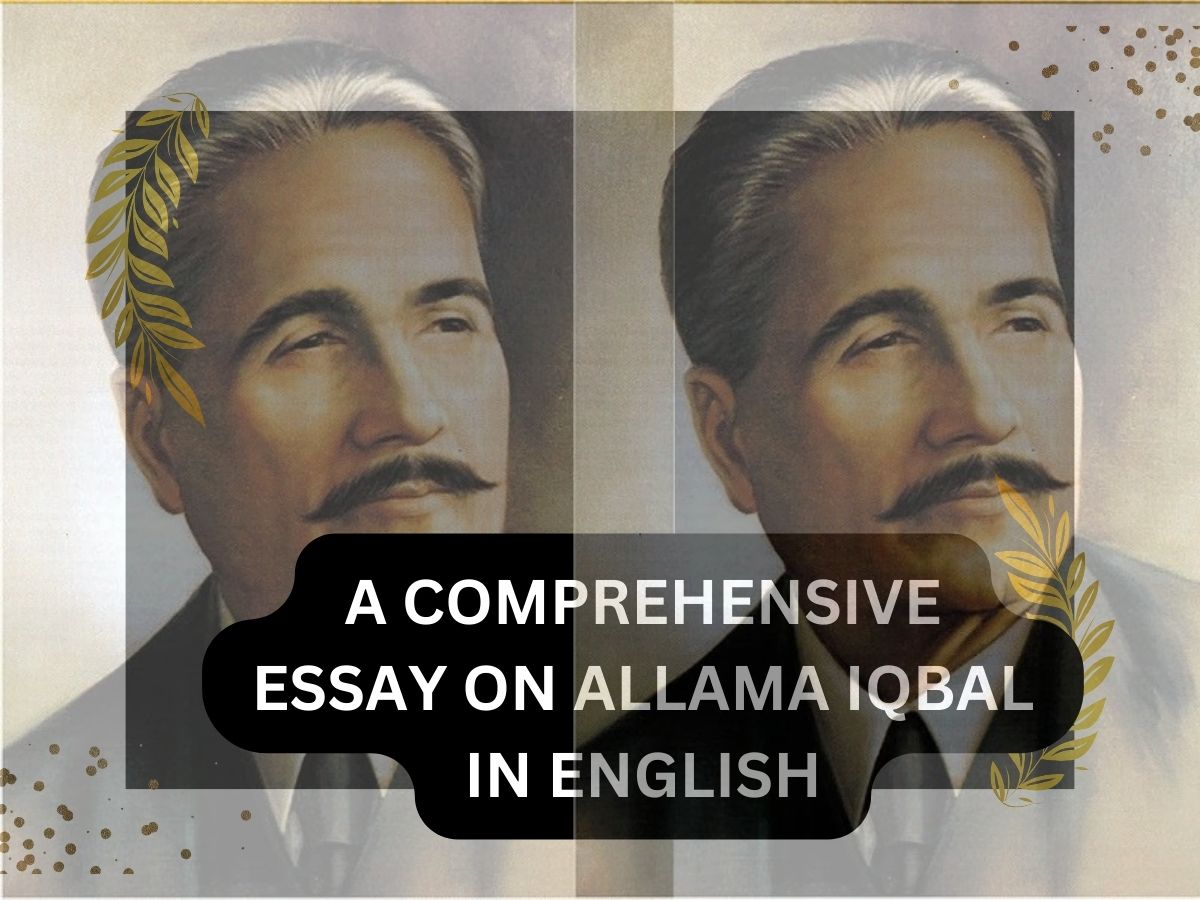
Introduction to Allama Muhammad Iqbal (Essay On Allama Iqbal ):
Allama Muhammad Iqbal , often called Allama Iqbal, was a famous poet, philosopher, and thinker from Pakistan. He was born on November 9, 1877, in Sialkot, which is a part of Pakistan. Iqbal’s ideas and work have had a big impact on the culture, thinking, and politics of the region.
Table of Contents
His date of death is April 21, 1938 (at the age 60 years), in Lahore Pakistan.
Let’s discuss his life below with wisdom and ambitions.
Early Life and Schooling
Iqbal grew up in a simple family and got his early education in Sialkot. He loved learning and went to Lahore for more schooling. He did very well there. Later, he went to Europe for higher studies and got degrees in philosophy and law from respected universities.
Writing and Thinking
Iqbal wrote poetry that is famous for its deep thoughts and beautiful words. He wrote in Urdu and Persian, talking about spiritual and deep ideas. His poems made people think about themselves, spirituality, and life’s meaning.
Apart from poetry, Iqbal wrote about his ideas for bringing new life to Islamic thinking and making Muslims stronger. He talked about important things like individuality, self-belief, and the role of religion in society. His words inspired many people.
Active in Politics
Iqbal didn’t just write poetry; he was also involved in politics. He strongly supported the rights of Muslims in British India and played a big role in the Pakistan Movement. This movement led to the creation of Pakistan in 1947. His speeches and writings gave strength and unity to Muslims.
The concept of Pakistan
The concept of Pakistan was presented by Allama Muhammad Iqbal, a renowned poet, philosopher, and political thinker. He first proposed the idea of a separate homeland for Muslims in his presidential address at the All-India Muslim League’s annual session in Allahabad in 1930. Iqbal’s vision laid the groundwork for the Lahore Resolution, which later led to the creation of Pakistan.
The concept of Shaheen in Allama Iqbal’s Philosophy:
In Allama Iqbal’s ideas, “Shaheen”(The eagle) is really important. It’s not just a bird; it means someone with big dreams and strong beliefs. Iqbal talks about the Shaheen like it’s a person who wants to be really smart and good. The Shaheen is like a symbol for people who keep trying to be better and never give up. It shows that everyone has the potential to do great things if they work hard and believe in themselves. Iqbal wants everyone to be like the Shaheen, always aiming high and never giving up on their dreams.
Iqbal’s Vision for Muslims
Iqbal believed in “Khudi,” which means selfhood. He wanted Muslims to be confident, creative, and morally strong. He wanted them to embrace their Islamic culture and be proud in the modern world.
Shayer-e-Mashriq:
Shayer-e-Mashriq, which means “Poet of the East,” is a title given to Allama Muhammad Iqbal, a famous poet, philosopher, and politician from British India who played a significant role in the intellectual and political landscape of South Asia during the early 20th century. Iqbal’s poetry often focused on themes of self-discovery, spirituality, and the revitalization of the Muslim community. His simple yet profound verses resonated deeply with people, inspiring them to strive for self-improvement and social change. Through his poetry, Iqbal urged Muslims to embrace their cultural heritage, seek knowledge, and work towards creating a more just and equitable society. His words continue to inspire millions around the world, transcending barriers of language and culture.
Influence and Legacy
Iqbal’s ideas still inspire people worldwide. In Pakistan, he is honored as the national poet and remembered for his part in the country’s independence. Beyond Pakistan, his thoughts have touched scholars, poets, and activists everywhere, shaping discussions on identity, spirituality, and fairness.
Some Famous Quotes by Allama Iqbal
“Be aware of your own worth, use all of your power to achieve it.” “The ultimate aim of the ego is not to see something, but to be something.” “The person who has no self-respect is like a corpse.” “Raise yourself to such heights that even the universe starts to admire you.” “The biggest sin is that you forget your own identity.” “A man who has no vision, he has no future.” “Nations are born in the hearts of poets, they prosper and die in the hands of politicians.” “Words, without power, are nothing but mere philosophy.” “Don’t be a slave to others when Allah has created you free.” “If you have nothing to say, don’t say anything. But if you have something to say, let it out boldly.”
To sum up, Allama Muhammad Iqbal was more than just a poet or philosopher; he was a thinker who sparked a movement for change. His poetry and ideas are still relevant today, guiding and inspiring people in a changing world.
Leave a Reply Cancel reply
Your email address will not be published. Required fields are marked *
Save my name, email, and website in this browser for the next time I comment.
- Privacy Policy

My Hero in History Essay Quaid e Azam
My hero in history essay, quaid e azam essay.
Quality, not quantity. should be the measure of one's character. (Douglas Jerrold).
Personality is to man what perfume is to flower. (Charles Lamb)
A man of courage is also full of faith. (Cicero)
Post a Comment
Trending Topics
Latest posts.
- 1st year Urdu past papers solved pdf download 2023
- 1st year Urdu Guess Paper New 2024
- 1st year guess paper 2024 Punjab Board pdf
- 1st year education guess paper 2024 pdf download
- 1st year economics guess paper 2024 pdf download
- 1st year chemistry guess paper 2024 pdf download
- 1st year all subjects notes for FBISE and Punjab Boards pdf
- 1st year education paper scheme 2024
- 1st year Past papers solved and unsolved all Punjab Boards
- 1st year Urdu Khulasa Nasar and Nazam pdf download
- 1st year English guess paper 2024 Punjab board
- 2nd year guess paper 2024 Punjab board
- 2nd year English guess paper 2024 for Punjab Boards
- 1st year English MCQs Objective Solved Notes
- 1st year English complete notes pdf download
- 2nd year tarjuma tul Quran book pdf download
- BISE Hyderabad
- BISE Lahore
- bise rawalpindi
- BISE Sargodha
- career-counseling
- how to pass
- Punjab Board
- Sindh-Board
- Solved mcqs
- Student-Guide
Allama Iqbal Essay in English (Easy and Outstanding)
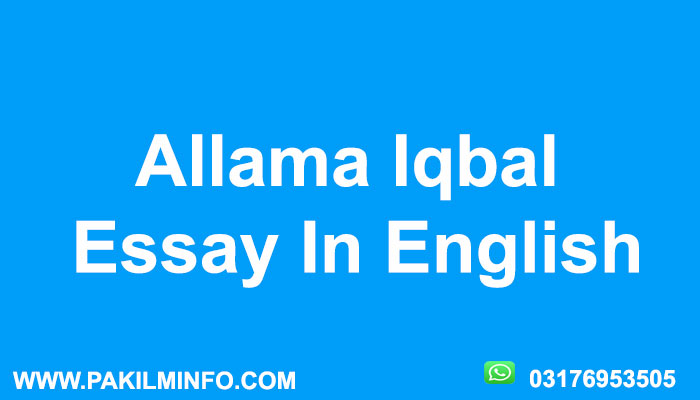
Here I am going to write an Essay on Allama Iqbal in English . This is a very simple and easy-to-learn essay in English for all class students. Every student can prepare Allama Iqbal Essay in English from here according to his/her choice.
Allama Iqbal Essay in English (Easy)
Allama Iqbal is our national poet. Allama Muhammad Iqbal” was born in Sialkot on November 9, 1877. His forefathers came from Kashmir. His father Shaikh Noor Muhammad was a pious man. He passed his Intermediate examination from Murray College, Sialkot.
Read: Allama Iqbal Essay in English for Childs
Syed Mir Hassan taught him Arabic, Persian and Islamic studies. He did his M.A. in Philosophy from the Government College, Lahore. He went abroad for higher education. He had the degree of Bar-at-Law. He went to Germany and got a degree of Ph.D. He came back to his country.
He wrote many poems to awake the Muslims. The Muslims were poor, uneducated and lived in very unhappy conditions. Being the national poet and a thinker, he taught the Muslims a sense of self-respect, In 1930 at Allahbad, he gave the idea of a separate homeland for the Muslims of India.
He passed away on the 21st of April, 1938. He was buried outside the Badshahi Masjid in Lahore. Bang-e-Dara, Baal-e-Jibraeel, Zarb-e-Kaleem and Javed Nama are his famous books.
Allama Iqbal Essay in English for Class 10 & 12
Birth of allama iqbal:.
Allama Muhammad Iqbal was born on November 9, 1877 in Sialkot. He belonged to an ancient family of Kashmiri Pandits. His forefathers converted to Islam two hundred and fifty years ago and emigrated from Kashmir and settled in Sialkot. Allama Muhammad Iqbal was fortunate in that he got the opportunity to be blessed with the training of good and virtuous parents. His father Sheikh Noor Muhammad was a Sufi man. His mother Mohtarma Imam Bibi was a wise woman.
Read: Allama Iqbal Essay in English for Class 6
Early education:
Allama Muhammad Iqbal’s early education, like that of ordinary Muslim children, took place in the school according to the custom of the time. Then he entered Mission School Sialkot. He was intelligent from childhood. He passed the fifth class examination with a scholarship and also got a scholarship in the last grade of middle school. He also achieved a prominent position in the inter-class which was the basis for admission in the college.
Discipleship of Maulana Mir Hassan:
When he entered the Scotch Mission College, Sialkot. He had the opportunity to make regular use of Maulana Syed Mir Hassan, a very capable teacher of Arabic and Persian. Allama Muhammad Iqbal studied up to FA in Sialkot. After that, he was sent to Lahore to get higher education. Scotch Mission College was not called Murray College at the time.
Education in Lahore:
Allama Iqbal came to Lahore in 1895 and entered Government College Lahore. His subjects here were English philosophy and Arabic. In 1997 he passed the BA exam and came first in the Arabic subject and won two gold medals. At that time Professor Thomas Arnold was a famous teacher of philosophy.
Allama Muhammad Iqbal had his own tendency towards philosophy and he got the opportunity to be a student of a famous philosopher like Arnold. Allama Muhammad Iqbal took admission in MA Philosophy in 1997. After passing his MA, he started lecturing on history, philosophy and politics at Oriental College, Lahore.
Read: Allama Iqbal Short Essay in English for Class 2, 3, 4 and 5
Higher education:
Allama Muhammad Iqbal traveled to England in 1905 for higher studies in philosophy and law. He passed the barrister’s examination from the University of Cambridge and later obtained the degree of Doctor of Philosophy from the University of Munich, Germany.
He also served as a Professor of Arabic at the University of London for six months, as deputy of Professor Arnold. After that, he returned home with many academic honors and degrees. He mastered Arabic, Persian, Sanskrit and many European languages.
Return to Home from Abroad:
After completing his higher education, he decided to return home and arrived in Lahore in 1908 where he received a warm welcome. He started practicing law in Lahore and also taught philosophy for 18 months at Government College, Lahore. Because Mr. James, the college’s professor of philosophy, had died and no English teacher could be immediately appointed in his place.
Poetry of Allama Iqbal:
Before moving to Europe, his poetry was limited. He used to write poems about the nation and homeland. Most of his poetry was in Urdu. After returning from Europe, his poetry changed and he started reciting poetry mostly in Persian. His Urdu poetry became famous even before 1901. He wrote a philosophical Masnavi Israr Khudi which was published in 1915. This Masnavi became more popular in England than in India.
Professor Nicholson published an English translation of the Masnavi. In this way, the Western world became acquainted with the ideas of Allama Muhammad Iqbal. Renowned critic Professor Dixon commented on the Masnavi in detail and praised it. This had a great effect on the British government and in January 1923, Allama Muhammad Iqbal was honored as “Sir”.
Ethics and Dress:
Although he was educated in English, led a pious and simple life. He spent most of his time studying. Eaten only once in 24 hours. Even during the health issues, his style was such that there was no difference in daily routine. He met his visitors with the same smile and warmth as he had in health.
He wore a kurta and shalwar in the early days. He wore a white turban or a loincloth. However, when he went to Europe, he had to wear English clothes. When he returned, he usually wore a Turkish hat with a shalwar kameez and a coat. Sometimes he wore a coat and trousers. By the way, he did not like English clothes.
Patriotism:
Allama Muhammad Iqbal was against the political disintegration of patriotism. Patriotism was ingrained in him. He was very attached to his homeland and this is a natural passion. His homeland was Kashmir. He expressed his love for Kashmir in various ways. He was also the secretary of several Kashmiri associations
The love of the Prophet (peace and blessings of Allah be upon him):
Allama Muhammad Iqbal was a figure of non-Islamic. The Holy Prophet (peace and blessings of Allah be upon him) could not tolerate the slightest disrespect to Islam and the greats of Islam. The love of the Prophet (peace and blessings of Allah be upon him) was embedded in their veins and fibers. Had Allama Sarwar Kainat (peace be upon him) been mentioned, Allama Iqbal’s tears would have flowed. In his words, devotion to the person of the Holy Prophet (peace and blessings of Allah be upon him) is expressed.
Death of Allama Iqbal
He died on 21 April 1938 and was buried near the main gate of Badshahi Mosque Lahore.
More Essays in English:
Courtesy Essay for 10th Class with Quotations Libraries Essay for 10th Class with Quotations Plastic Pollution Essay in English for Students Save Water Save Earth Essay in English A True Muslim Essay with Quotations
2 thoughts on “Allama Iqbal Essay in English (Easy and Outstanding)”
Add quotes in essay
Very nice essay.Its like very simple and easy in my opinion.i would rate this approximately 8.5/10😀😀😀
Leave a Comment Cancel reply
Save my name, email, and website in this browser for the next time I comment.
- Quote of the Day
- Picture Quotes
Muhammad Iqbal Quotes
Standart top banner.

If one cannot live the life of the brave, then it is better to die like the brave.
Life is a struggle and not a matter of privilege. It is nothing but one's knowledge of the temporal and the spiritual world.
From your past emerges the present, and from the present is born your future.
People who have no hold over their process of thinking are likely to be ruined by liberty of thought. If thought is immature, liberty of thought becomes a method of converting men into animals.
The wing of the Falcon brings to the king, the wing if the crow brings him to the cemetery.
Nations are born in the hearts of poets, they prosper and die in the hands of politicians.
Words, without power, is mere philosophy.
I tell you the sign of a believer; When Death comes, there is a smile on his lips
The ultimate aim of the ego is not to see something, but to be something.
Democracy is a system where people are counted not weighed.
I tell the truth: your enemy is also your friend-his presence makes your life fuller and richer.
Look at the evils of the world around you and protect yourself from them. Our teachers give all the wrong messages to our youth, since they take away the natural flare from the soul. Take it from me that all knowledge is useless until it is connected with your life, because the purpose of knowledge is nothing but to show you the splendors of yourself!
It is absolutely certain that God does exist.
When the thinking of a people becomes corrupt, the pure silver becomes impure in its hands.
It is true that we are made of dust. And the world is also made of dust. But the dust has motes rising.
A community receives light from its history, it becomes aware of itself by remembrance of its history.
But inner experience is only one source of human knowledge.
Everything that possesses life dies if it has to live in uncongenial surroundings.
Man is primarily governed by passion and instinct.
The man of Love follows the path of God-and shows affection to both the believer and the nonbe-liever.
Our bread and water are of one table: the progeny of Adam are as a single soul.
Islam is itself destiny and will not suffer destiny.
I lead no party; I follow no leader. I have given the best part of my life to careful study of Islam, its law and polity, its culture, its history and its literature.
The possessor of a sound heart puts to test his power by entering into big adventures.
last adds STANDART BOTTOM BANNER
Send report.
- The author didn't say that
- There is a mistake in the text of this quote
- The quote belongs to another author
- Other error
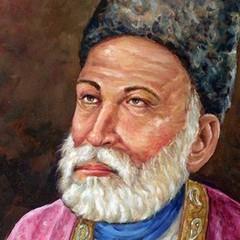
Related Authors

Muhammad Iqbal
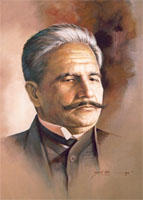
- Born: November 9, 1877
- Died: April 21, 1938
- Occupation: Philosopher
- Cite this Page: Citation
Get Social with AzQuotes
Follow AzQuotes on Facebook, Twitter and Google+. Every day we present the best quotes! Improve yourself, find your inspiration, share with friends
Popular Topics
- Inspirational
- Motivational
SIDE STANDART BANNER
- Quotes about:
- Javascript and RSS feeds
- WordPress plugin
- ES Version AZQuotes.ES
- Submit Quotes
- Privacy Policy
Login with your account
Create account, find your account.

100 Words Essay On Allama Iqbal In English
Muhammad Iqbal is Allama Iqbal’s full name. Sir Muhammad Iqbal was born on November 9, 1877, in Punjab, India, and died on April 21, 1938. He lived for 61 years. He suffered for a long time due to throat disease and thereafter passed away. He had an arranged marriage and had two daughters.
He is a Muslim poet and philosopher. He gave the idea of Pakistan and became the national poet of Pakistan. He is also known as the political thinker of Pakistan. He had no interest in fame and wealth and was down to earth. He is highly regarded for his Persian works.
His famous poems are “Shikwa” and “Jawab-e-Shikwa”, “A Cow and a Goat”, “A longing, “A mother’s dream”, and so on. He was a very talented man and loved so dearly, especially for his poetic works and his Islamic way of life.
Related Posts:
- Random Dog Breed Generator Tool
- Random Phrase Generator [English]
- Michael Poem by William Wordsworth Summary, Notes and Line by Line Explanation in English
- Speech on Allama Iqbal in English for All Classes
- Random Disease Generator [Fake & Real]
- Two Planets Poem by Allama Muhammad Iqbal Summary, Notes and Line by Line Explanation in English

aaj ik aur baras biit gayā us ke baġhair
jis ke hote hue hote the zamāne mere
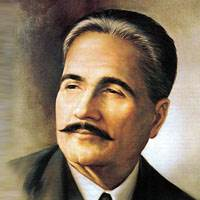
Allama Iqbal
1877 - 1938 | Lahore , Pakistan
One of the greatest Urdu Poets. National poet of Pakistan who penned 'Saare jahaan se achha hindostaan hamara' and 'Lab pe aati hai dua ban ke tamanna meri'
- Index of Poets
- Top Read Poets
- Classical Poets
- Women Poets
- Young Poets
- Poet Audios
E-book 1357
- TOP 20 SHAYARI 21
Image Shayari 22
Aflak se aata hai nalon ka jawab aakhir, dhund raha hai farang aish-e-jahan ka dawam, khudi ho ilm se mohkam to ghairat-e-jibril, ne mohra baqi ne mohra-bazi, ye payam de gai hai mujhe baad-e-subh-gahi, insan aur bazm-e-qudrat, صبح خورشيد درخشاں کو جو ديکھا ميں نے, koshish-e-na-tamam, فرقت آفتاب ميں کھاتي ہے پيچ و تاب صبح, masud marhum, يہ مہر و مہ، يہ ستارے يہ آسمان کبود, rindon ko bhi malum hain sufi ke kamalat, رندوں کو بھي معلوم ہيں صوفي کے کمالات, جہان تازہ کي افکار تازہ سے ہے نمود, sher-o-shayari 134.
haañ dikhā de ai tasavvur phir vo sub.h o shaam tū
dauḌ pīchhe kī taraf ai gardish-e-ayyām tū
han dikha de ai tasawwur phir wo subh o sham tu
dauD pichhe ki taraf ai gardish-e-ayyam tu
kabhī ham se kabhī ġhairoñ se shanāsā.ī hai
baat kahne kī nahīñ tū bhī to harjā.ī hai
kabhi hum se kabhi ghairon se shanasai hai
baat kahne ki nahin tu bhi to harjai hai
milegā manzil-e-maqsūd kā usī ko surāġh
añdherī shab meñ hai chīte kī aañkh jis kā charāġh
milega manzil-e-maqsud ka usi ko suragh
andheri shab mein hai chite ki aankh jis ka charagh
nigah buland suḳhan dil-navāz jaañ pur-soz
yahī hai raḳht-e-safar mīr-e-kārvāñ ke liye
nigah buland suKHan dil-nawaz jaan pur-soz
yahi hai raKHt-e-safar mir-e-karwan ke liye
tū ne ye kyā ġhazab kiyā mujh ko bhī faash kar diyā
maiñ hī to ek raaz thā sīna-e-kā.enāt meñ
tu ne ye kya ghazab kiya mujh ko bhi fash kar diya
main hi to ek raaz tha sina-e-kaenat mein

Hamaari Rooh Ko Us Waqt Apnaa Irfaan Haasil Hota Hai, Jab Hum Kisi Mufakkir Se Rushanaas Hote Hain. Jab Tak Main Goete Ke Tasawwuraat Ki La-mutanaahiyat Se Be-Khabar Tha. Us Waqt Tak Main Apni Kam-Maaegi Par Muttala Na Tha.
Eik Muqaddas Jhoot Hai.
Insaanon Se Milne Waale Sadmaat Ke Ilaawa Insaan Ki Yaaddaasht Aam Taur Par Kharaab Hoti Hai.
Shaairi Mein Mantiqi Sachchaai Ki Talaash Bilkul Be-kaar Be-takhayyul Ka Nasb-ul-ain Husn Hai, Na Ki Schchaai. Isliye Kisi Funkaar Ki Azmat Ko Zaahir Karne Ke Liye Uski Takhleeqaat Mein Se Wo Iqtibaasaat Pesh Na Kijiye. Jo Aapki Raaye Mein Sciency Haqaaeq Par Mushtamil Hon.
Taareekh-e-eik Tarah Ki Amali Akhlaaqiyaat Hai. Doosre Uloom Ki Tarah Agar Akhlaaqiyaat Eik Tajurbaati Ilm Hai. To Use Insaani Tajurbaat Ke Inkishaafaat Par Mabni Hona Chaahiye. Is Nuqta-e-nazar Ke Barmala Izhaar Se Un Logon Ke Bhi Naazuk Ehsaasaat Ko Yaqeenan Sadma Pahunchega. Jo Akhlaaq Ke Muaamle Mein Sakht-geer Hone Ke Daawedaar Hain. Lekin Jinkaa Avaami Kirdaar Taareekhi Taalimaat Se Mutayyan Hota Hai.
dilon ko markaz-e-mehr-o-wafa kar
Ek muflis-e-khuddar ye kahta tha khuda se, fitrat meri manind-e-nasim-e-sahari hai, hathon se apne daman-e-duniya nikal gaya, ladkian padh rahi hain angrezi, koi dekhe to meri nai-nawazi, nigah uljhi hui rang-o-bu mein, tera andesha aflaki nahin hai, tera tan ruh se na-ashna hai, teri duniya jahan-e-murgh-o-mahi, ai chaudhary saahab aaj aap nange hi chale aae, anokhi tasneef, nagahani sadma, roghan phosphorus ka ehsan, tawaif se rishta.
1985 Ka Iqbaliyati Adab Ek Jaiza
1986 Ka Iqbaliyati Adab Ek Jaiza
A Critical Exposition of Iqbal's Philosophy
A Message From The East
Payam-e-Mashriq Ka English Tarjuma
A New Approch To Iqbal
A Voice From The East
The Poetry of Iqbal
Aaina Khana-e-Iqbal
Aaina-e-Ajam
Aaina-e-Iqbal
Tazminat Bar Kalam-e-Iqbal
Aaina-e-Iqbaliyat
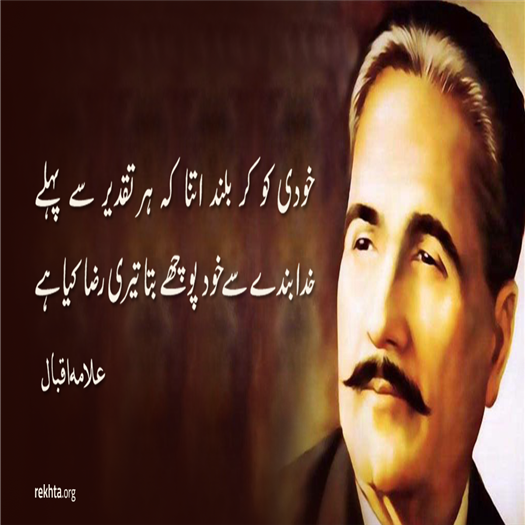
KHudii ko kar buland itnaa ki har taqdiir se pahle KHudaa bande se KHud puuchhe bataa terii razaa kyaa hai
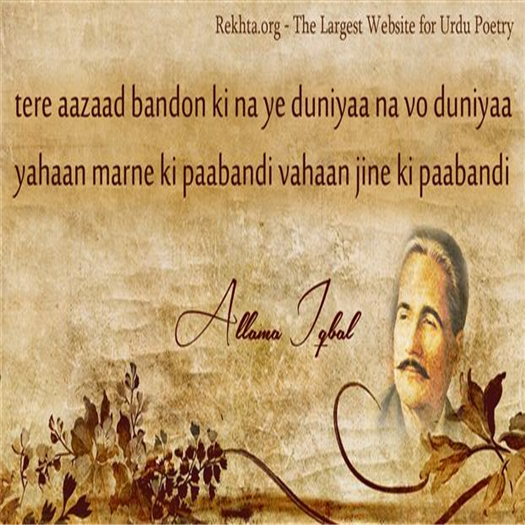
tire aazaad bando.n kii na ye duniyaa na vo duniyaa yahaa.n marne kii paabandii vahaa.n jiine kii paabandii
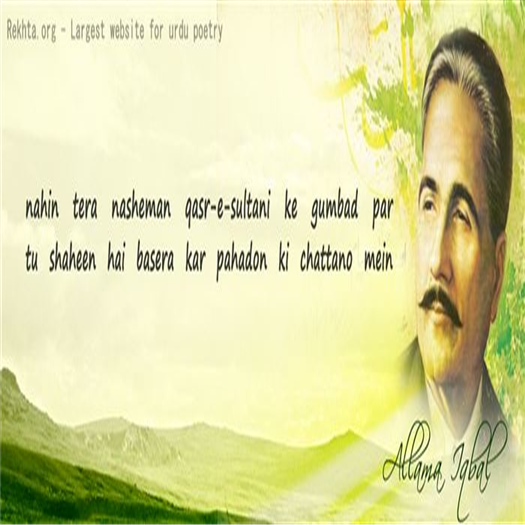
nahii.n teraa nasheman qasr-e-sultaanii ke gumbad par tuu shaahii.n hai baseraa kar pahaa.Do.n kii chaTaano.n me.n

vajuud-e-zan se hai tasviir-e-kaa.enaat me.n ra.ng isii ke saaz se hai zindagii kaa soz-e-daruu.n
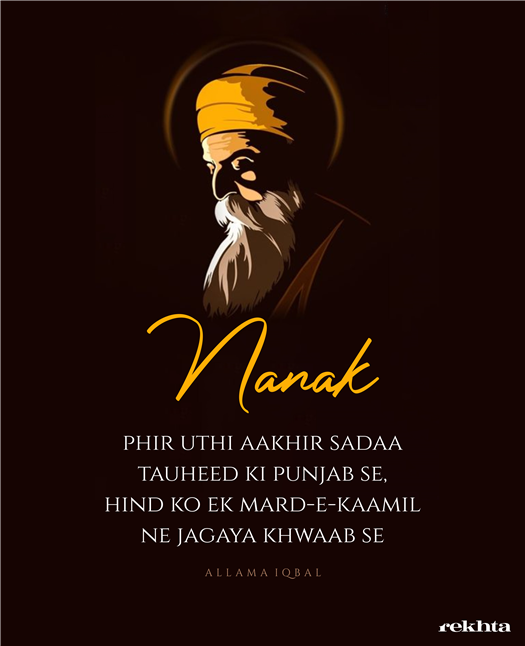
qaum ne paiGaam-e-gautam kii zaraa parvaa na kii qadr pahchaanii na apne gauhar-e-yak-daana kii aah bad-qismat rahe aavaaz-e-haq se be-KHabar Gaafil apne phal kii shiiriinii se hotaa hai shajar aashkaar us ne kiyaa jo zindagii kaa raaz thaa hind ko lekin KHayaalii falsafa par naaz thaa sham-e-haq se jo munavvar ho ye vo mahfil na thii baarish-e-rahmat hu.ii lekin zamii.n qaabil na thii aah shuudar ke liye hindostaa.n Gam-KHaana hai dard-e-insaanii se is bastii kaa dil begaana hai barhaman sarshaar hai ab tak mai-e-pindaar me.n sham-e-gautam jal rahii hai mahfil-e-aGyaar me.n but-kada phir baad muddat ke magar raushan hu.aa nuur-e-ibraahiim se aazar kaa ghar raushan hu.aa phir uThii aaKHir sadaa tauhiid kii punjab se hind ko ik mard-e-kaamil ne jagaayaa KHvaab se
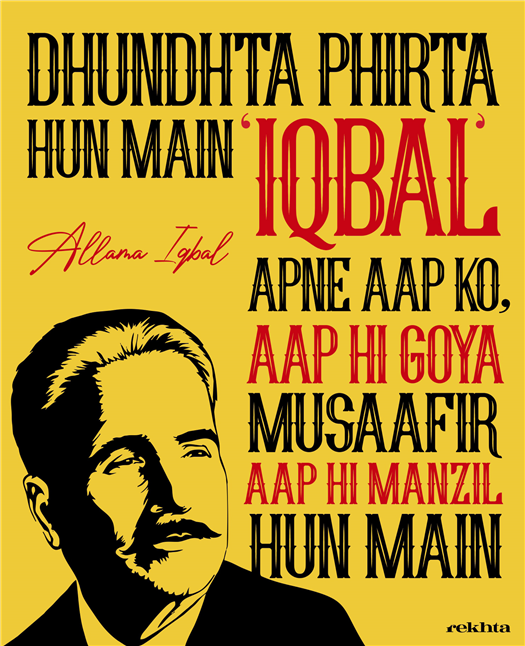
Dhuu.nDtaa phirtaa huu.n mai.n 'iqbaal' apne aap ko aap hii goyaa musaafir aap hii manzil huu.n mai.n
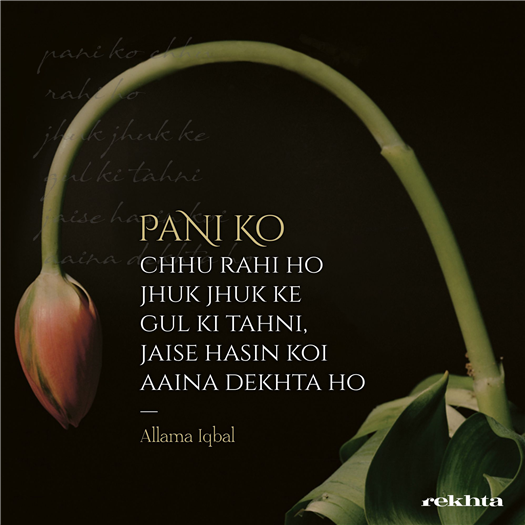
duniyaa kii mahfilo.n se uktaa gayaa huu.n yaa rab kyaa lutf anjuman kaa jab dil hii bujh gayaa ho shorish se bhaagtaa huu.n dil Dhuu.nDtaa hai meraa aisaa sukuut jis par taqriir bhii fidaa ho martaa huu.n KHaamushii par ye aarzuu hai merii daaman me.n koh ke ik chhoTaa saa jho.npa.Daa ho aazaad fikr se huu.n uzlat me.n din guzaaruu.n duniyaa ke Gam kaa dil se kaa.nTaa nikal gayaa ho lazzat sarod kii ho chi.Diyo.n ke chahchaho.n me.n chashme kii shorisho.n me.n baajaa saa baj rahaa ho gul kii kalii chaTak kar paiGaam de kisii kaa saaGar zaraa saa goyaa mujh ko jahaa.n-numaa ho ho haath kaa sirhaanaa sabze kaa ho bichhaunaa sharmaa.e jis se jalvat KHalvat me.n vo adaa ho maanuus is qadar ho suurat se merii bulbul nanhe se dil me.n us ke khaTkaa na kuchh miraa ho saf baa.ndhe dono.n jaanib buuTe hare hare ho.n naddii kaa saaf paanii tasviir le rahaa ho ho dil-fareb aisaa kohsaar kaa nazaara paanii bhii mauj ban kar uTh uTh ke dekhtaa ho aaGosh me.n zamii.n kii soyaa hu.aa ho sabza phir phir ke jhaa.Diyo.n me.n paanii chamak rahaa ho paanii ko chhuu rahii ho jhuk jhuk ke gul kii Tahnii jaise hasiin ko.ii aa.iina dekhtaa ho meh.ndii lagaa.e suuraj jab shaam kii dulhan ko surKHii liye sunahrii har phuul kii qabaa ho raato.n ko chalne vaale rah jaa.e.n thak ke jis dam ummiid un kii meraa TuuTaa hu.aa diyaa ho bijlii chamak ke un ko kuTiyaa mirii dikhaa de jab aasmaa.n pe har suu baadal ghiraa hu.aa ho pichhle pahr kii koyal vo sub.h kii mo.azzin mai.n us kaa ham-navaa huu.n vo merii ham-navaa ho kaano.n pe ho na mere dair o haram kaa ehsaa.n rauzan hii jho.npa.Dii kaa mujh ko sahar-numaa ho phuulo.n ko aa.e jis dam shabnam vazuu karaane ronaa miraa vazuu ho naala mirii du.aa ho is KHaamushii me.n jaa.e.n itne buland naale taaro.n ke qaafile ko merii sadaa diraa ho har dardmand dil ko ronaa miraa rulaa de behosh jo pa.De hai.n shaayad unhe.n jagaa de
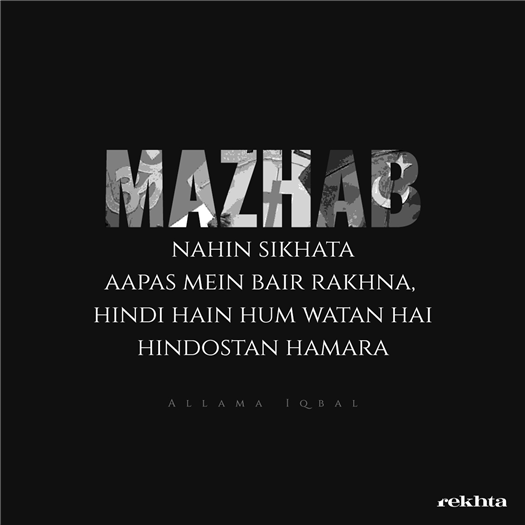
maz.hab nahii.n sikhaataa aapas me.n bair rakhnaa hindii hai.n ham vatan hai hindostaa.n hamaaraa
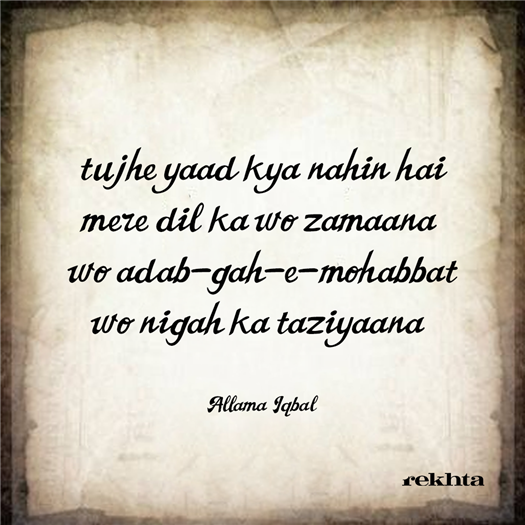
tujhe yaad kyaa nahii.n hai mire dil kaa vo zamaana vo adab-gah-e-mohabbat vo nigah kaa taaziyaana ye butaan-e-asr-e-haazir ki bane hai.n madrase me.n na adaa-e-kaafiraana na taraash-e-aazraana nahii.n is khulii fazaa me.n ko.ii gosha-e-faraaGat ye jahaa.n ajab jahaa.n hai na qafas na aashiyaana rag-e-taak muntazir hai tirii baarish-e-karam kii ki ajam ke mai-kado.n me.n na rahii mai-e-muGaana mire ham-safiir ise bhii asar-e-bahaar samjhe unhe.n kyaa KHabar ki kyaa hai ye navaa-e-aashiqaana mire KHaak o KHuu.n se tuu ne ye jahaa.n kiyaa hai paidaa sila-e-shahid kyaa hai tab-o-taab-e-jaavedaana tirii banda-parvarii se mire din guzar rahe hai.n na gila hai dosto.n kaa na shikaayat-e-zamaana
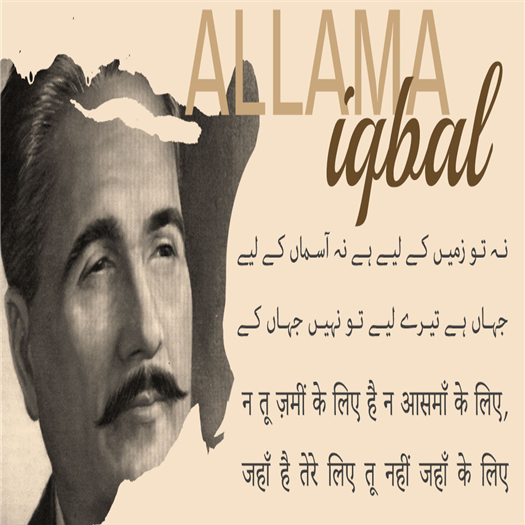
na tuu zamii.n ke liye hai na aasmaa.n ke liye jahaa.n hai tere liye tuu nahii.n jahaa.n ke liye ye aql o dil hai.n sharar shola-e-mohabbat ke vo KHaar-o-KHas ke liye hai ye niistaa.n ke liye maqaam-e-parvarish-e-aah-o-laala hai ye chaman na sair-e-gul ke liye hai na aashiyaa.n ke liye rahegaa raavii o niil o furaat me.n kab tak tiraa safiina ki hai bahr-e-be-karaa.n ke liye nishaan-e-raah dikhaate the jo sitaaro.n ko taras ga.e hai.n kisii mard-e-raah-daa.n ke liye nigah buland suKHan dil-navaaz jaa.n pur-soz yahii hai raKHt-e-safar miir-e-kaarvaa.n ke liye zaraa sii baat thii andesha-e-ajam ne use ba.Dhaa diyaa hai faqat zeb-e-daastaa.n ke liye mire guluu me.n hai ik naGma jibra.iil-aashob sambhaal kar jise rakkhaa hai laa-makaa.n ke liye
Playing videos from section

Muzaffar Ali
Agar kaj-rau hai.n anjum aasmaa.n teraa hai yaa meraa, apnii jaulaa.n-gaah zer-e-aasmaa.n samjhaa thaa mai.n, dil soz se khaalii hai nigah paak nahii.n hai.
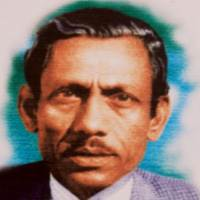
join rekhta family!
Sign up and enjoy FREE unlimited access to a whole Universe of Urdu Poetry, Language Learning, Sufi Mysticism, Rare Texts
Jashn-e-Rekhta | 8-9-10 December 2023 - Major Dhyan Chand National Stadium, Near India Gate - New Delhi
Rekhta Foundation
Devoted to the preservation & promotion of Urdu
Rekhta Dictionary
A Trilingual Treasure of Urdu Words
Online Treasure of Sufi and Sant Poetry
World of Hindi language and literature
The best way to learn Urdu online
Rekhta Books
Best of Urdu & Hindi Books
Top 37 Quotations on My Hero in History or My Favourite Personality
Quotations for my hero in history essay in english for fsc students.
Are you searching for My Hero in History Quotations in English for FSC? This post contains almost 37 Quotations for Essay my Favourite Personality. If you need more quotations for other essays, you should visit Quotes for Essays . There you will find almost all the required essay quotations which a students of Class 12 needs. If you already have an essay and you are looking for only quotations, note down all the quotations and choose the most appropriate 4 to 5 quotes for your content. The basic key is relevance. Try to choose the most relevant quotations for your Essay.
One more important thing on ilmihub I have shared a post with complete English essays for 2nd-year students. So, you can visit this post if you want English Essays for your 2nd year notes. Essay on My Favourite Personality or Essay on My Hero in History is one of the most important essays for FSC students. They can write this essay on the Life of Hazrat Muhammad (صلی اللہ علیہ وسلم) , on the life of Muhammad Ali Jinnah , on the life of Allama Muhammad Iqbal or any other personality which they like.
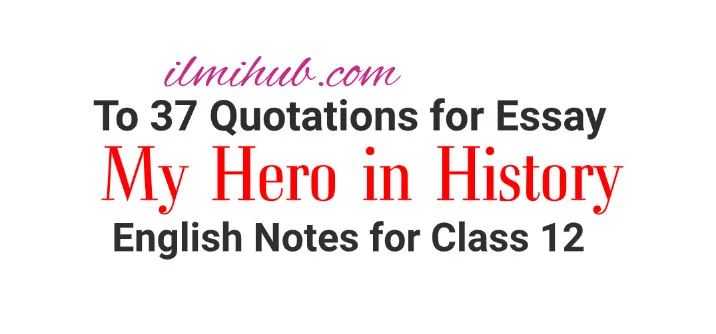
My Favourite Personality Essay Quotations in English for 2nd Year – Class 12 Notes
- “Greatness by nothing unless it be lasting.” (Napoleon)
- “Genius is 1% inspiration, 99% perspiration.” (Thomas Edison)
- “All history is the biography of great men.” (Carlyle)
- “Time makes heroes but dissolves celebrities.” (Boorstin)
- “Personality is an unbroken series of successful gestures.” (F.Satt)
- “A good man never dies.” (Callimachus)
- “The hero is one who kindles a great light in world who sets to blazes torches in dark streets of life for men to see.” (Felix Adler)
- “Hard times don’t create heroes. It is during the hard times when the ‘hero’ within us is revealed.” (Bob Riley)
- “Heroism is the divine relation which, in all times, unites a great man to other men.” (Thomas Carlyle)
- “A hero is an ordinary individual who finds the strength to persevere and endure in spite of overwhelming obstacles.” (Christopher Reeve)
- “Genius is the ability to put into effect what is on your mind.” (F. Scott Fitzgerald)
- “A hero is someone who has given his life to something bigger than himself.” (Joseph Compel)
- “A hero is someone who can be admired without apology.” (Kitty Kelly) “I think that we all do heroic things, but hero is not a noun, it’s a verb.” (Robert Downey, Jr.)
- “The hero living his own life being true to himself radiates a light by which others may see their own way.” (Laurence G Boldt)
- “Everyone is necessarily the hero of his own life story.” (John Barth)
- “A hero is someone who understands the responsibility that comes with his freedom.” (Bob Dylan)
- “Show me a hero and I’ll write you a tragedy.” (F. Scott Fitzgerald)
- “The hero draws inspiration from the virtue of his ancestors.” (Johann Wolfgang von Goethe)
- “Heroes aren’t born, they’re cornered. Oh, I was cornered. And I found out that I was no hero.” (James Belushi)
- “The real hero is always a hero by mistake; he dreams of being an honest coward like everybody else.” (Umberto Eco)
- “A mentor enables a person to achieve. A hero shows what achievement looks like.” (John C. Mather)
- I like this quote I dislike this quote “Not the glittering weapon fights the fight, but rather the hero’s heart.” (Proverb)
- “We are the hero of our own story.” (Mary McCarthy)
- “A hero is a man who is afraid to run away.” (English Proverb)
- “The difference between a hero and a coward is one step sideways.” (Gene Hackman)
- “The ordinary man is involved in action, the hero acts. An immense difference.” (Henry Miller)
- “Everybody is a hero in their own story if you just look.” (Maeve Binchy)
- “A hero is someone who has given his or her life to something bigger than oneself.” (Joseph Campbell)
- “A hero is one who knows how to hang on one minute longer.” (Novalis)
- “Hero shows you how to solve the problem – yourself.” (Jet Li)
- “A hero is no braver than an ordinary man, but he is braver five minutes longer.” (Ralph Waldo Emerson)
- “True heroism consists in being superior to the ills of life, in whatever shape they may challenge us to combat.” (Napoleon)
- “A hero cannot be a hero unless in a heroic world.” (Nathaniel Hawthorne)
- “A hero is a man who does what he can.” (Romaine Rolland)
- “To be born with a personality is a gift from your parents. But to die as a personality is an achievement of your own.” (Unknown)
- “It takes a hero to be one of those men who goes into battle.” (Norman Schwarzkopf)
- “Heroes are ordinary people who make themselves extraordinary.” (Gerard Way)
My Hero in History Essay Quotes for Class 12
You May also like:
- Corona Virus Essay Quotations
- Why I Love Pakistan Essay Quotations
- My Aim in Life | My Ambition in Life | The Career I Like to Choose Essay Quotations
- The Pleasure of Gardening | My Hobby Essay Quotations
- More In Quotations for Essays

Top 17 Quotations for A Rainy Day Essay

Top 20 Quotations for Cricket Match Essay for Students

Top 15 City Life Essay Quotations for Class 10 and Class 12
April 9, 2022 at 2:47 am
Sir you just solved my problem. Thank you so so so so much.
August 2, 2023 at 8:21 pm
Thanks for helping me
Leave a Reply Cancel reply
Your email address will not be published. Required fields are marked *

- Privacy Policty
- Terms of Service
- Advertise with Us

COMMENTS
Short Essay on Allama Iqbal for 10th Class, 2nd Year and Graduation with Quotations. The Hero is "a person who is admired for having done something very brave or having achieved something great. (Cambridge Advanced Learners) The hero is seen as a man of exceptional qualities and matchless genius. He has the potential and courage to change the ...
Allama Iqbal was the great poet-philosopher and active political leader born at Sialkot, Punjab, in 1877. He descended from a family of Kashmiri Brahmans, who had embraced Islam about 300 years earlier. Allama Iqbal received his early education in the traditional Madrassa. Later he joined the Sialkot Mission School, from where he passed his ...
Essay on Allama Iqbal in 450 Words. The real name of Allama Iqbal was Mohammad Iqbal. He was born on November 9, in the year 1877, in Sialkot, Punjab. Iqbal belonged to a Kashmiri Brahmin family that embraced Islam in the seventeenth century. After receiving his traditional education in Arabic, Persian, and Urdu, he turned to liberal education ...
This is an English Essay on "Allam Muhammad Iqbal". This essay can be learnt by 2nd year and 10th class students. Allama Iqbal is our national poet. He was born at Sialkot on November 9, 1877. He belonged to a respectable Kashmiri family. You may Want to Read: Informal Letters; Personal Letters; English Stories with moral lessons; Applications ...
Essay on Allama Iqbal Quotes. I lead no party; I follow no leader. I have given the best part of my life to careful study of Islam, its law and polity, its culture, its history, and its literature ... 10th, first year and second year classes and you won't need to ask expert essay help from someone from Write My Paper Hub for writing your own ...
Allama Iqbal essay in English for class 1. Allama Iqbal, a distinguished poet and intellectual figure in Pakistan, came into the world on 9th November 1877 in Sialkot, a city situated in Punjab. Proficient in both Urdu and Persian languages, he earned the title of the "Poet of the East.". Deeply devoted to his country and religion, Allama ...
This essay will explore the life and legacy of Allama Iqbal, focusing on three key aspects of his contributions to Pakistani culture and politics. Allama Iqbal was a philosopher, poet, and politician who played a key role in the creation of Pakistan. Born in Sialkot, Punjab, in 1877, Iqbal completed his education in Lahore before traveling to ...
2nd Year English My Favourite Poet Allama Iqbal Essay with Outline & Quotations BSc BA FSc ICS FA NotesFor Essays: https://fscnotes0.blogspot.com/p/essays.ht...
Essay on Allama Iqbal. Allama Iqbal is one of the most influential Muslim thinkers. Allama Iqbal was one of the greatest philosophers, and poets as well as an active political leader. His poetry is quite famous and had a great impact on Pakistan's freedom movement. Mohammad Iqbal was born on the 9th of November 1877, in the city of Sialkot.
Allama Iqbal was born in Sialkot in 1877. He came to Lahore for learning after completing his primary education. At that time the English were the rules of India. They were very cunning. They did not like the Muslims. They tried their best to keep the Muslims backward and ignorant. Iqbal, who was a great well-wisher of the Muslims, tried to ...
Introduction to Allama Muhammad Iqbal (Essay On Allama Iqbal ): Allama Muhammad Iqbal, often called Allama Iqbal, was a famous poet, philosopher, and thinker from Pakistan. He was born on November 9, 1877, in Sialkot, which is a part of Pakistan.
Best Essay for FSc & Matric in URDU with Poetry and Quotes.Please SUBSCRIBE ️ the Channel here 👉🏻 https://rebrand.ly/ExamKiDunyaAlso Like 👍🏻 and Share t...
Quaid-e-Azam was born in Karachi on December 25, 1876. He was a very intelligent student. On passing the Matriculation examination, he went to England to study law. After four years, he as a barrister and started his practice in law in Karachi. Later, he shifted to Bombay and became one of the leading lawyers.
This is a very simple and easy-to-learn essay in English for all class students. Every student can prepare Allama Iqbal Essay in English from here according to his/her choice. Allama Iqbal Essay in English (Easy) Allama Iqbal is our national poet. Allama Muhammad Iqbal" was born in Sialkot on November 9, 1877. His forefathers came from Kashmir.
Introduction. Allama Muhammad Iqbal (1875 to 1938 CE) stood at the cusp of modernity in British India. As the "poet visionary" and "spiritual father" of Pakistan, his role as an anti-colonial intellectual who "dreamed" of carving out an independent Muslim homeland from British India is thoroughly ingrained in the popular imagination, state institutions, and political rhetoric.
The ultimate aim of the ego is not to see something, but to be something. Muhammad Iqbal. Inspirational, Motivational, Ego Problem. Masudul Hasan, Sir Muhammad Iqbal (1978). "Stories and Biographies from Iqbal". 68 Copy quote. Democracy is a system where people are counted not weighed. Muhammad Iqbal. People, Democracy.
This video covers essay on Allama Iqbal in urdu with poetry and quotations ,Essay on Allama iqbal for matric & fsc students.-----...
Sir Muhammad Iqbal was born on November 9, 1877, in Punjab, India, and died on April 21, 1938. He lived for 61 years. He suffered for a long time due to throat disease and thereafter passed away. He had an arranged marriage and had two daughters. He is a Muslim poet and philosopher.
mana ki teri did ke qabil nahin hun main. tu mera shauq dekh mera intizar dekh. sitāroñ se aage jahāñ aur bhī haiñ. abhī ishq ke imtihāñ aur bhī haiñ. sitaron se aage jahan aur bhi hain. abhi ishq ke imtihan aur bhi hain. tire ishq kī intihā chāhtā huuñ. mirī sādgī dekh kyā chāhtā huuñ. tere ishq ki intiha chahta hun.
Welcome friends to my channel CHIEF .This channel will provide you Educational videos so subscribe to this channel for more educational videos.MARIAM TARIQCHIEF
My Favourite Personality Essay Quotations in English for 2nd Year - Class 12 Notes. "Greatness by nothing unless it be lasting." (Napoleon) "Genius is 1% inspiration, 99% perspiration." (Thomas Edison) "All history is the biography of great men." (Carlyle) "Time makes heroes but dissolves celebrities." (Boorstin)